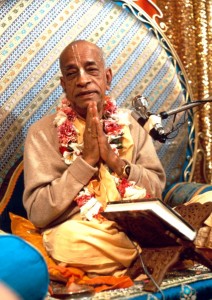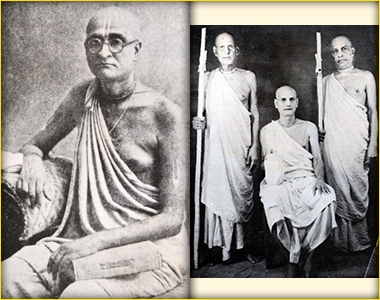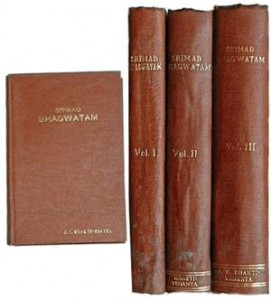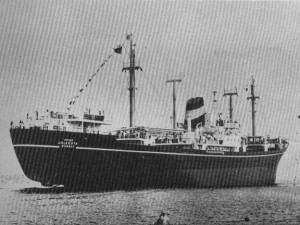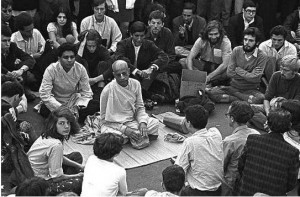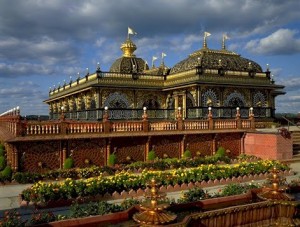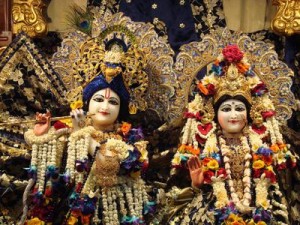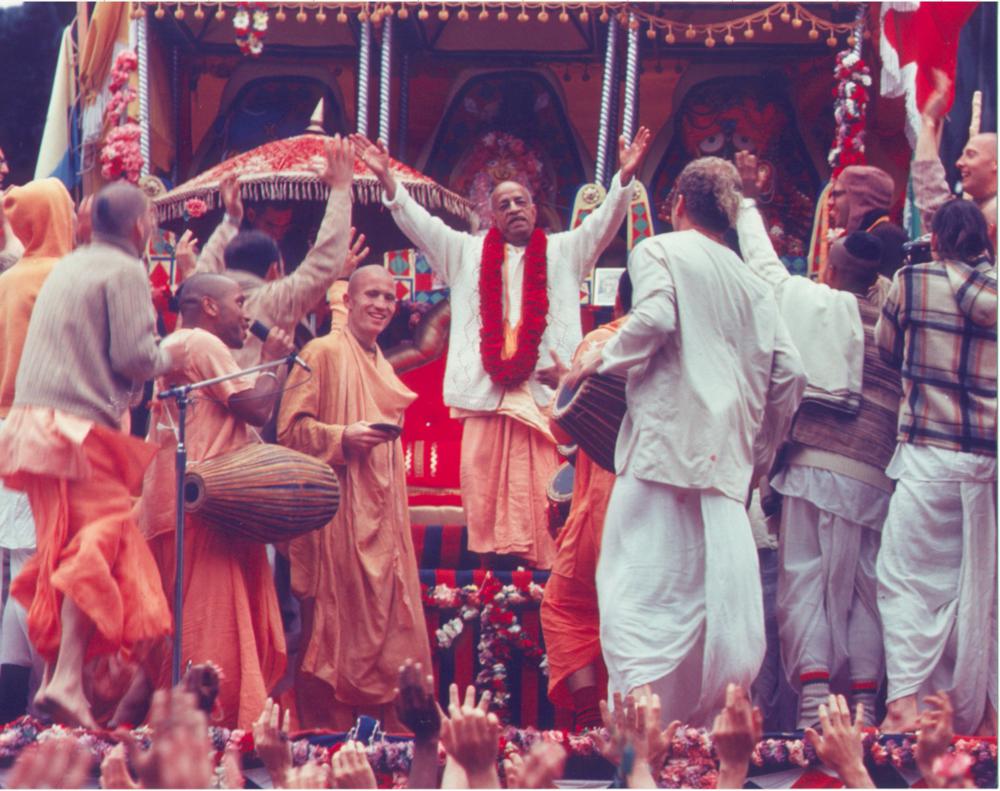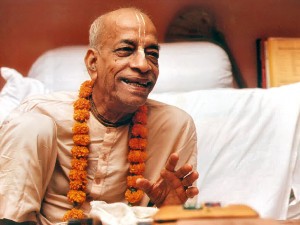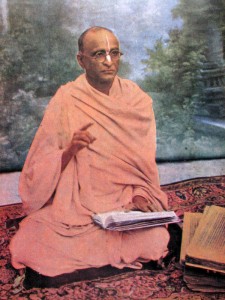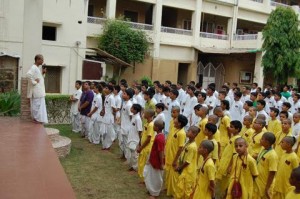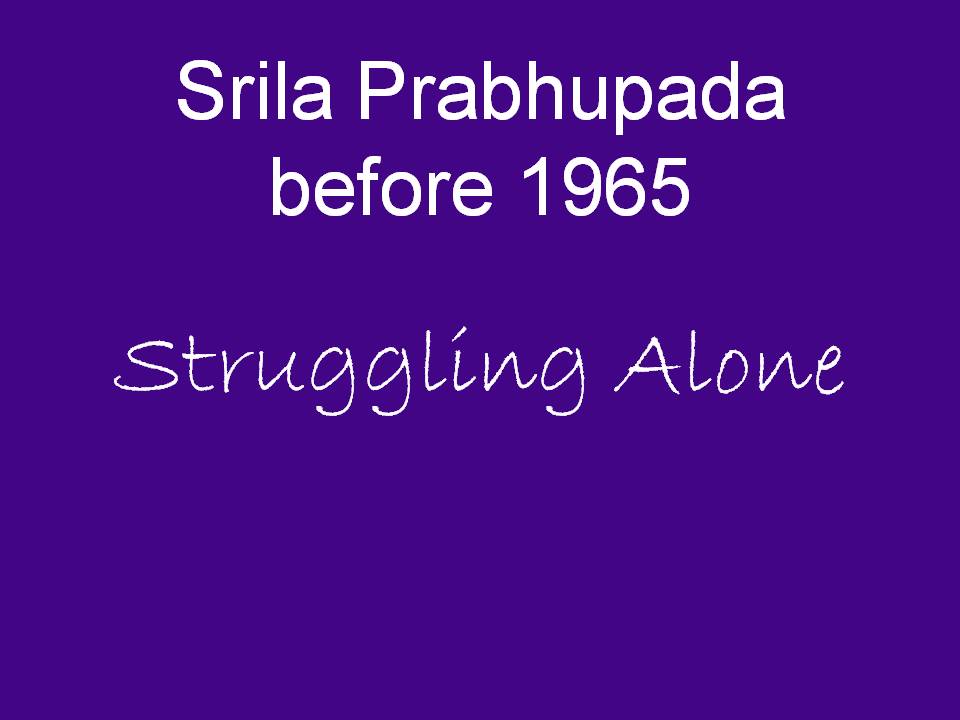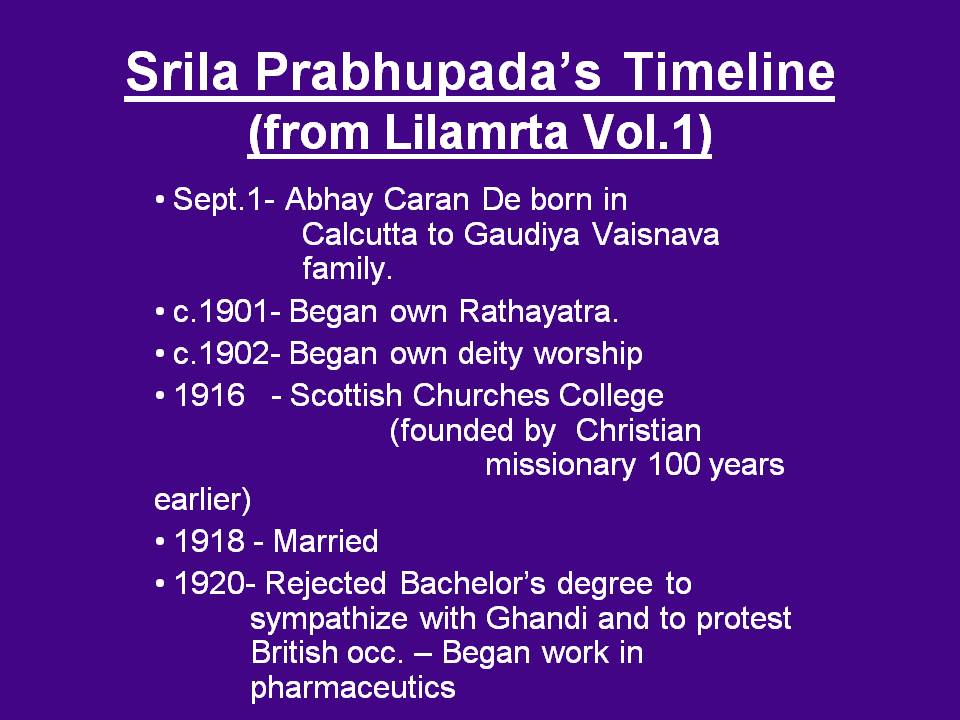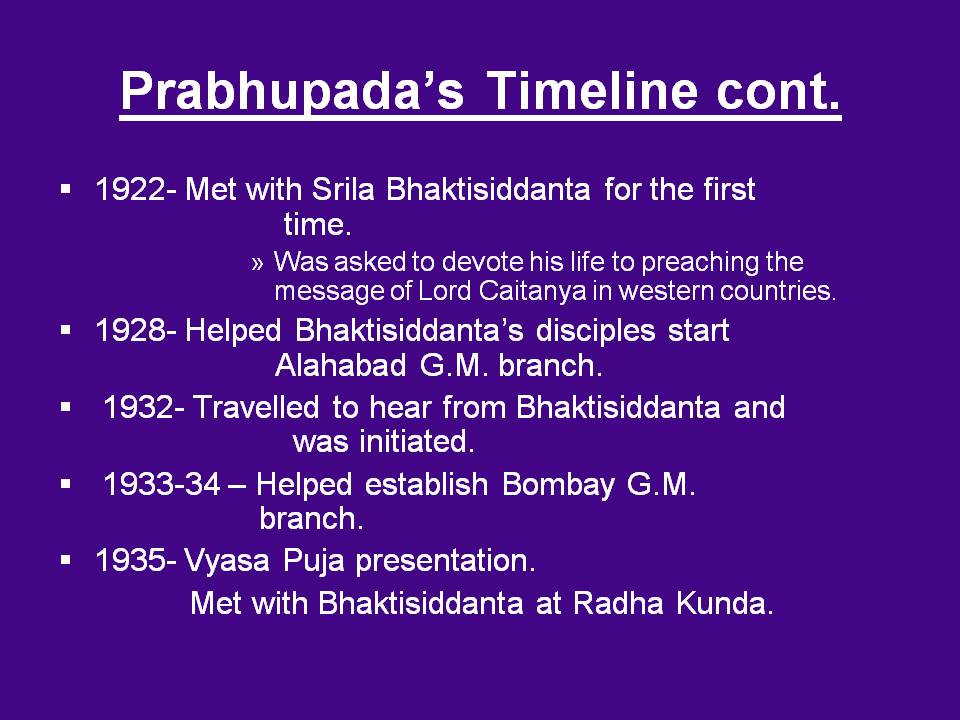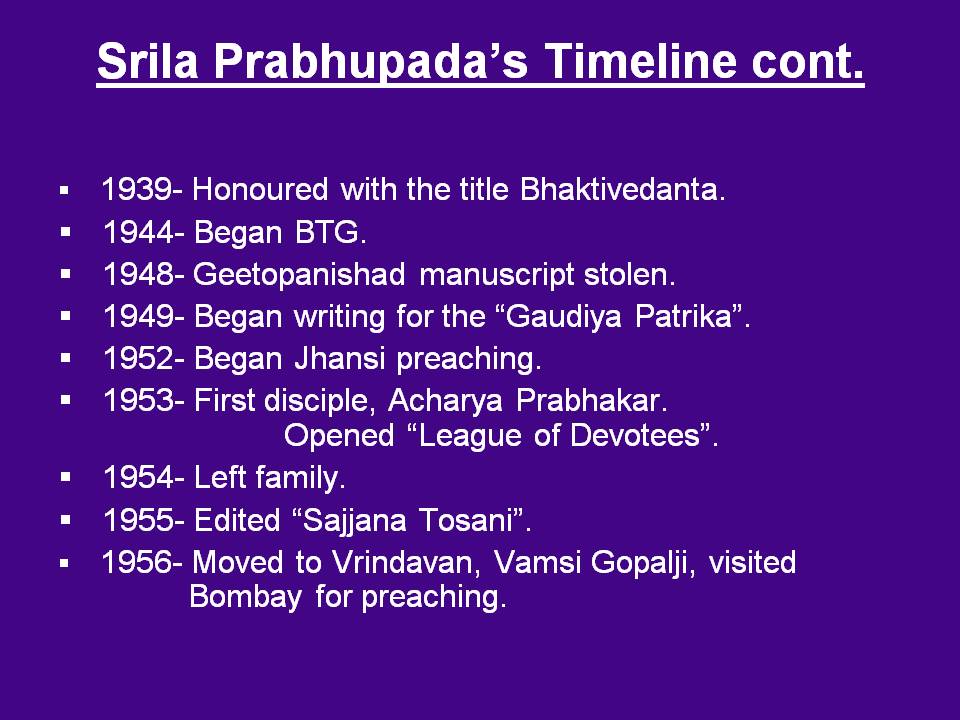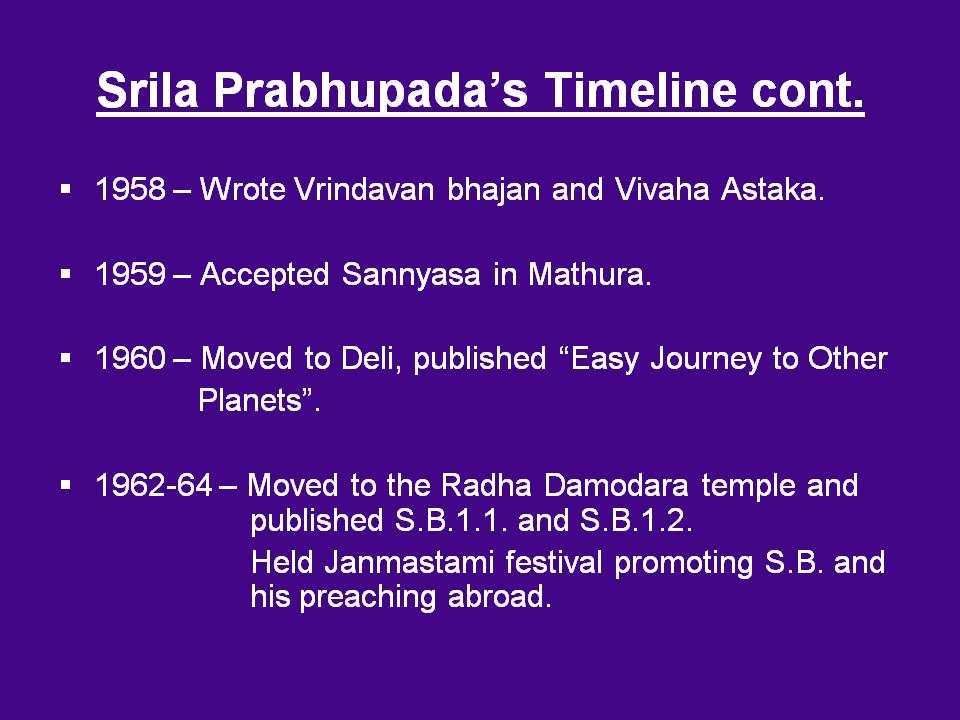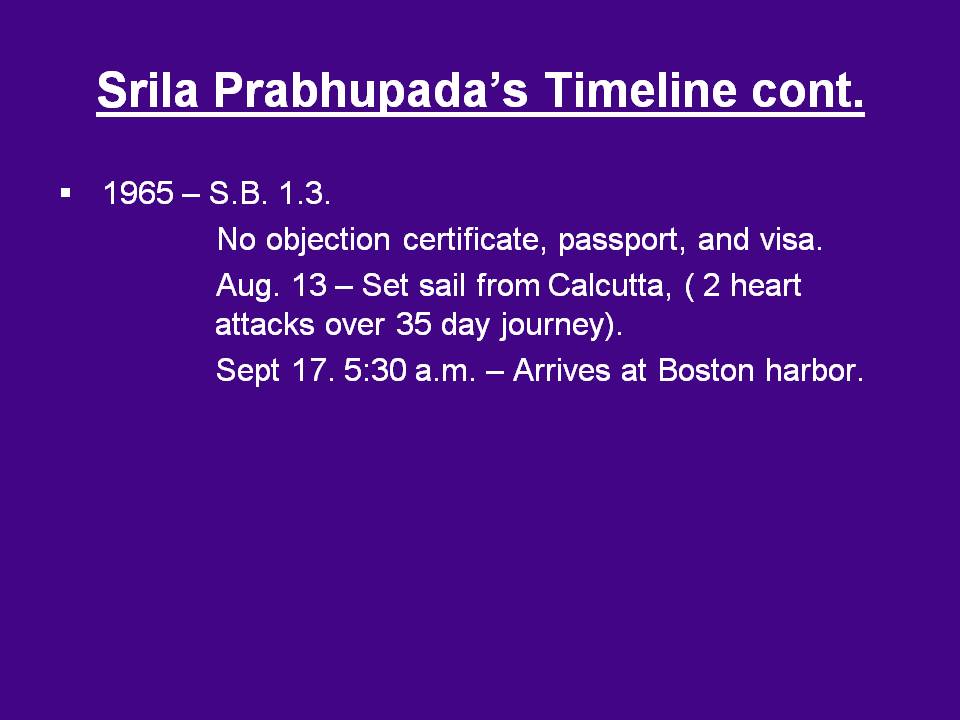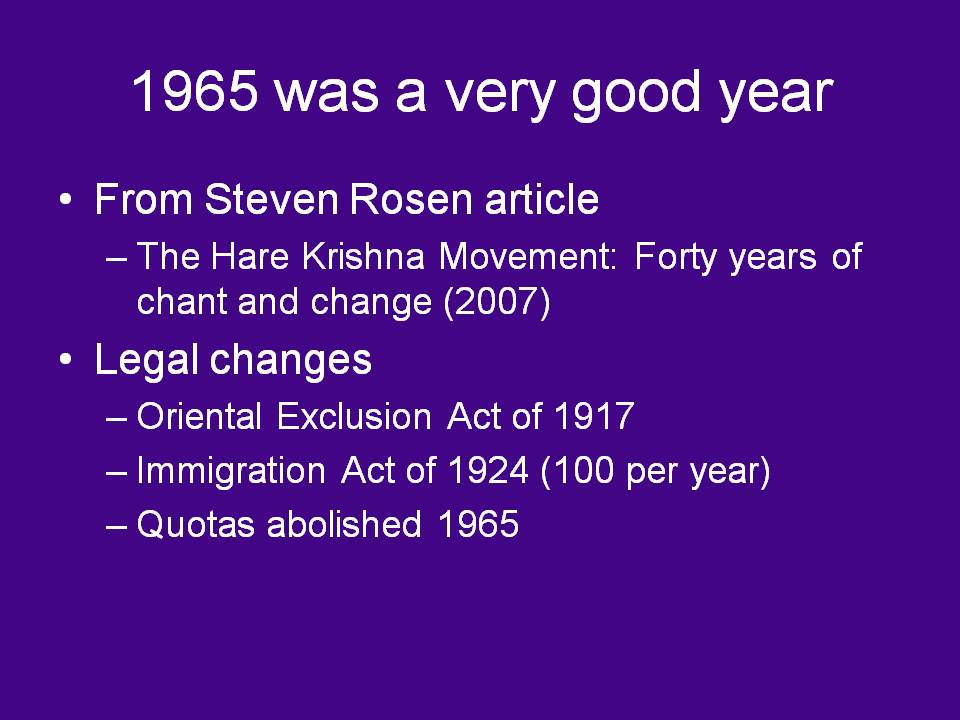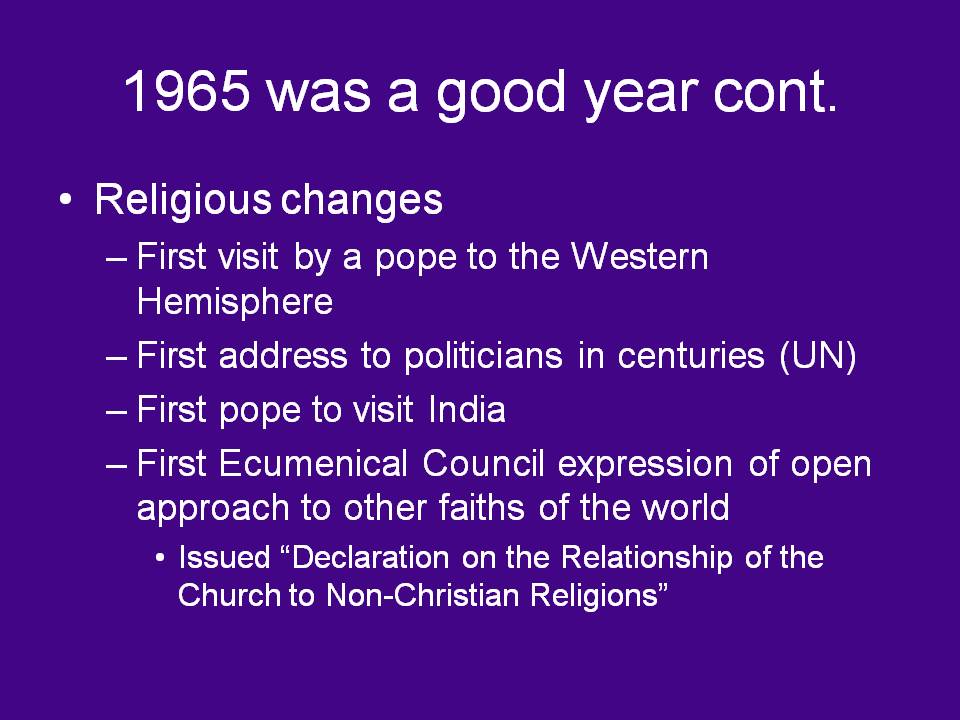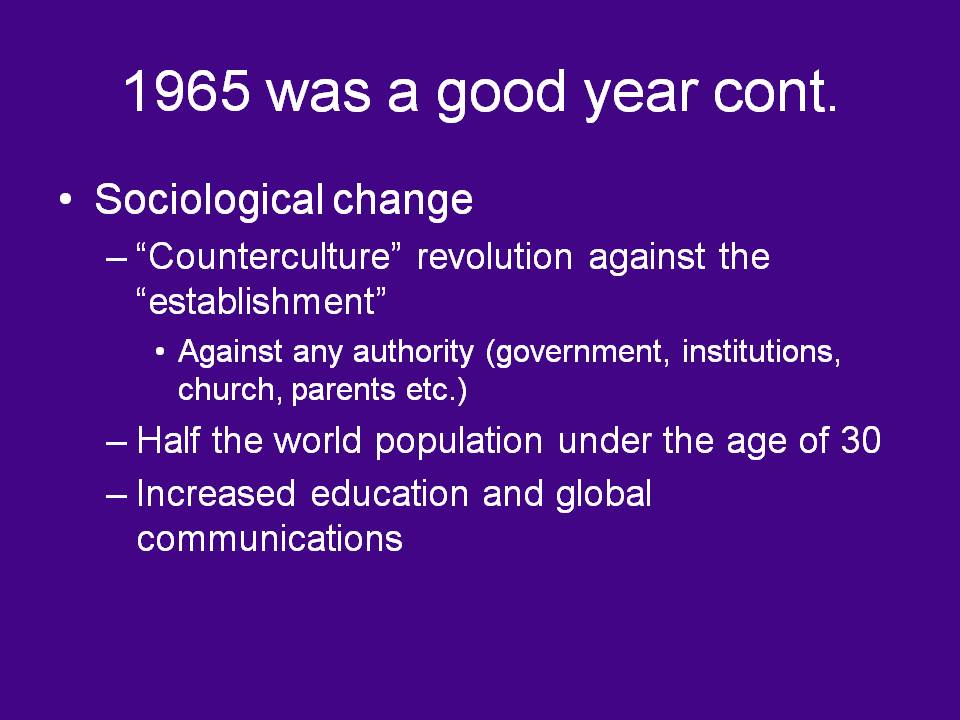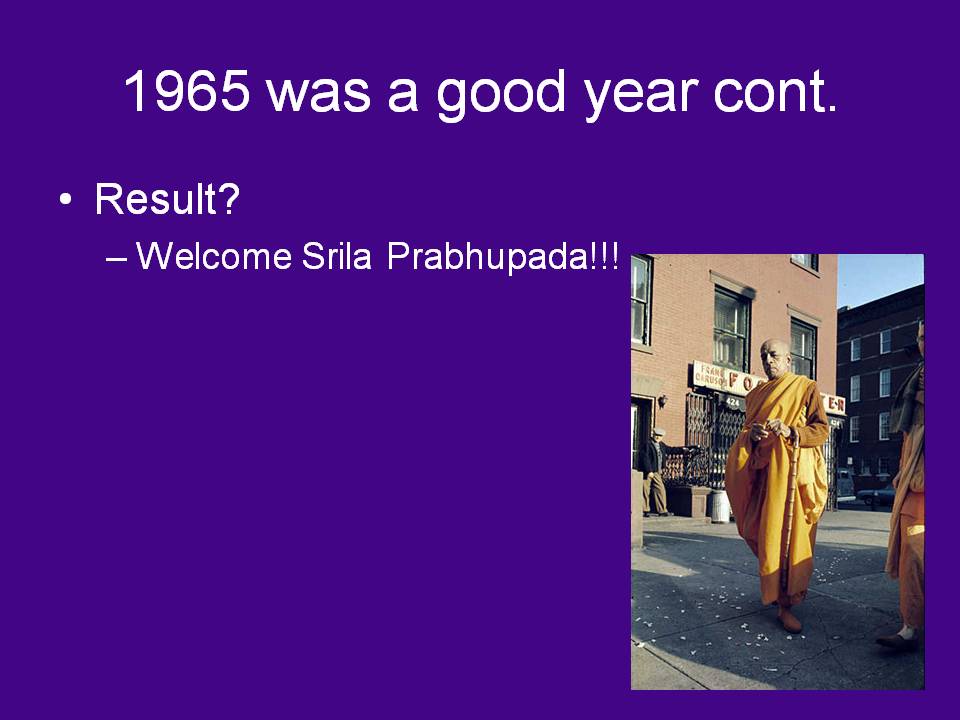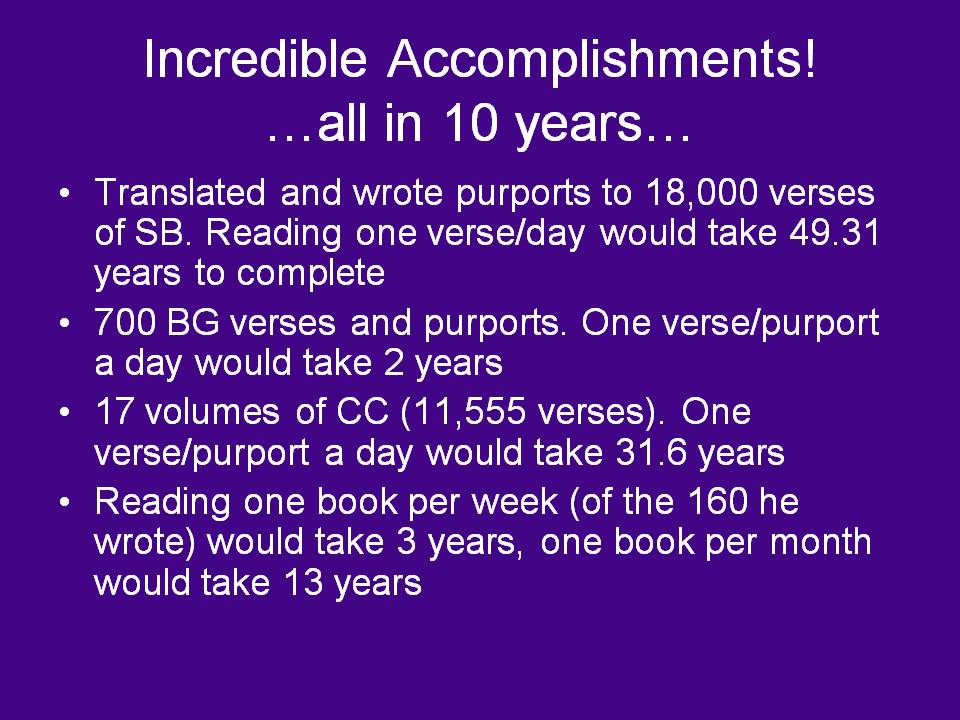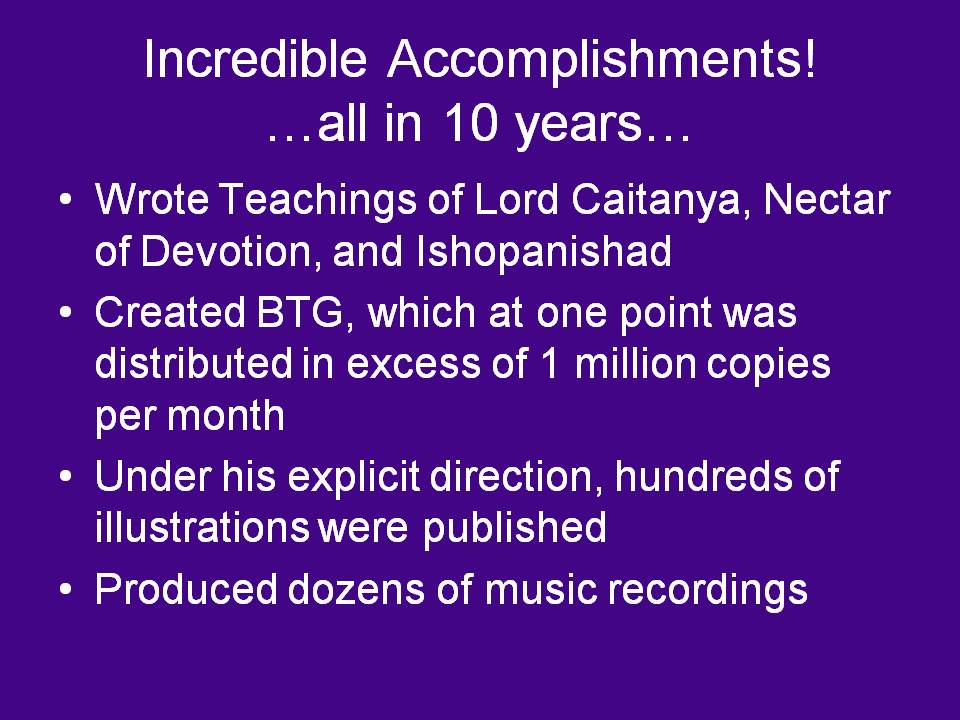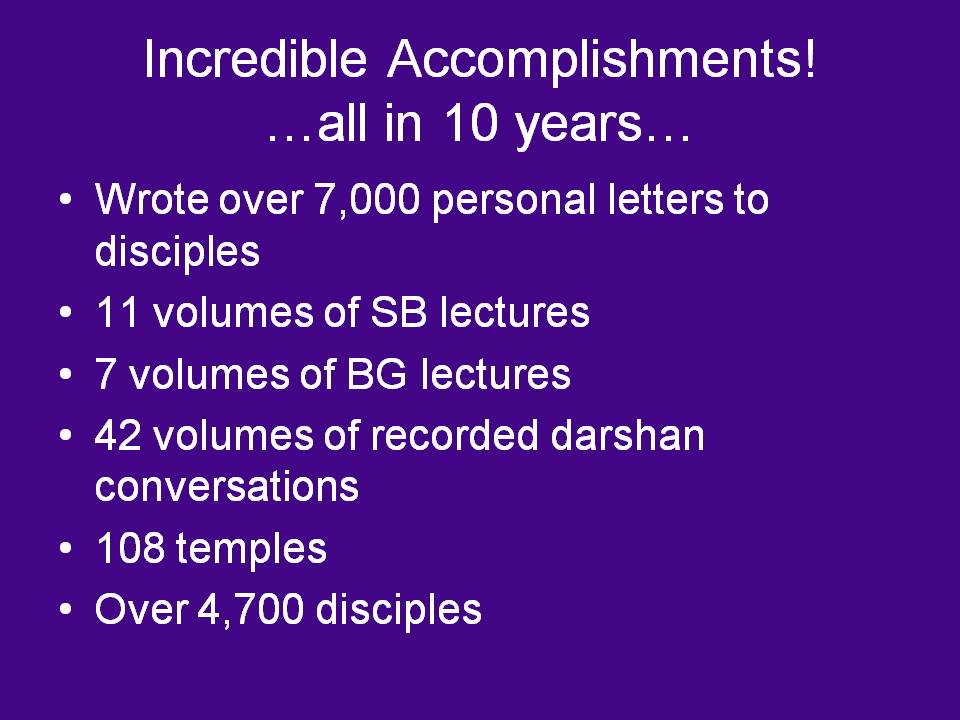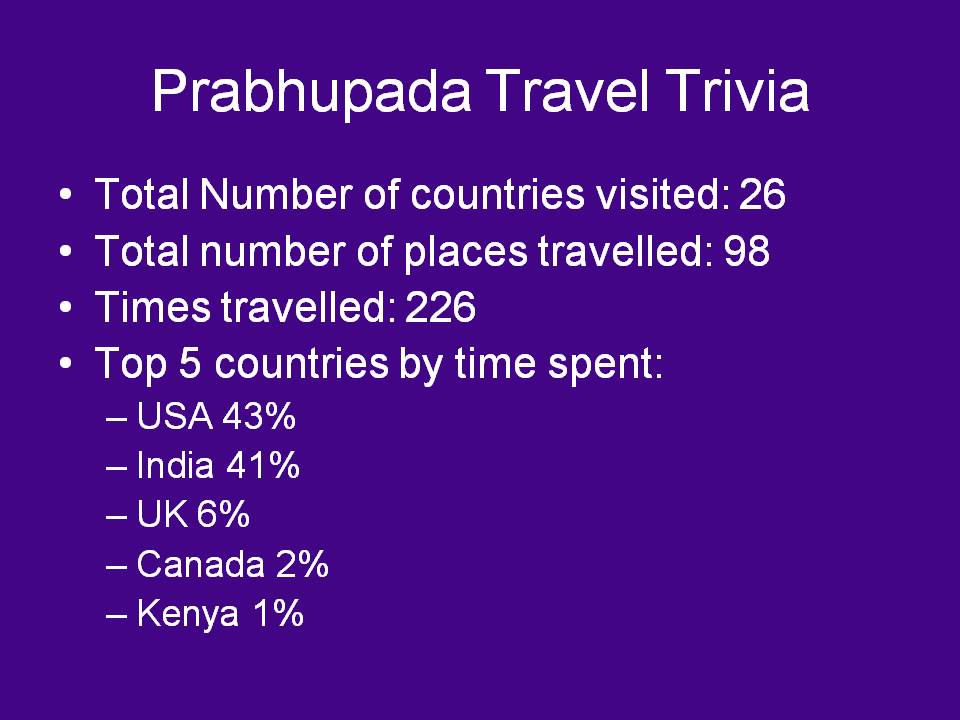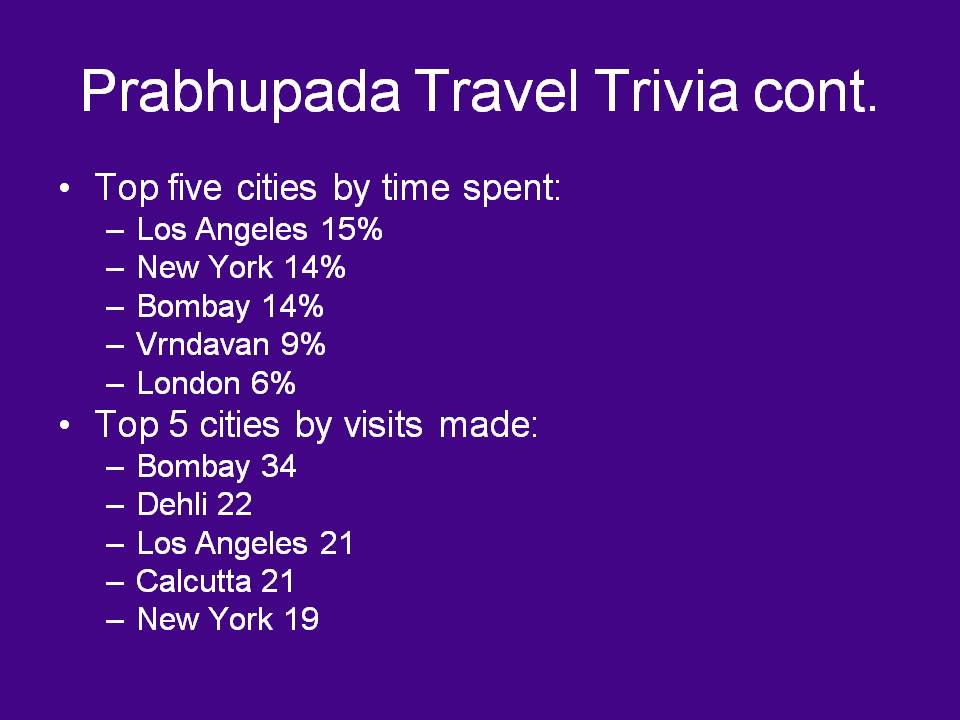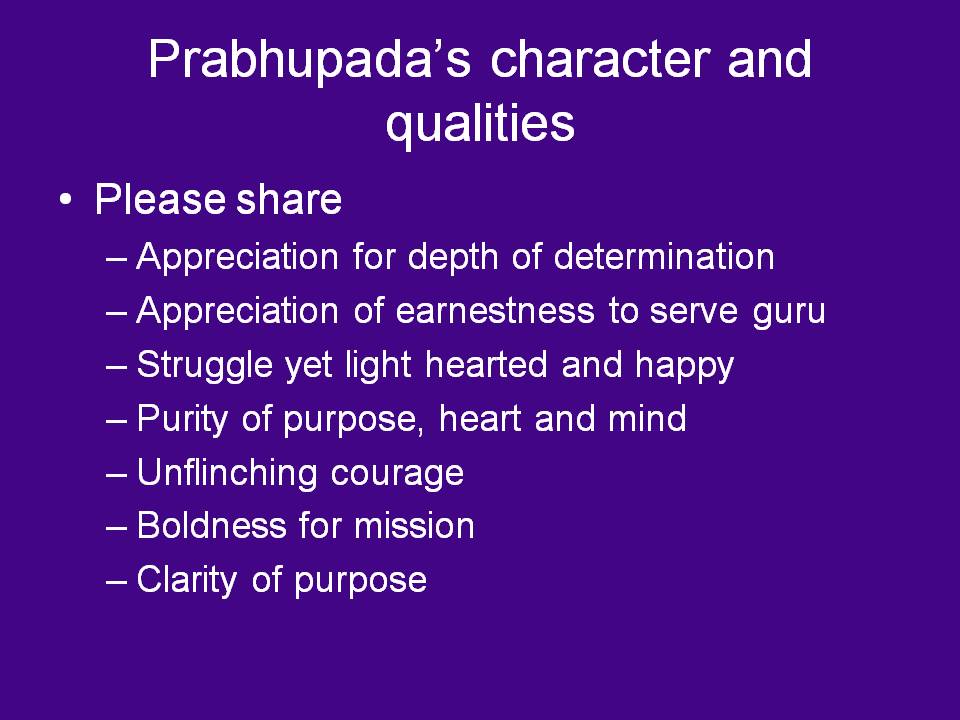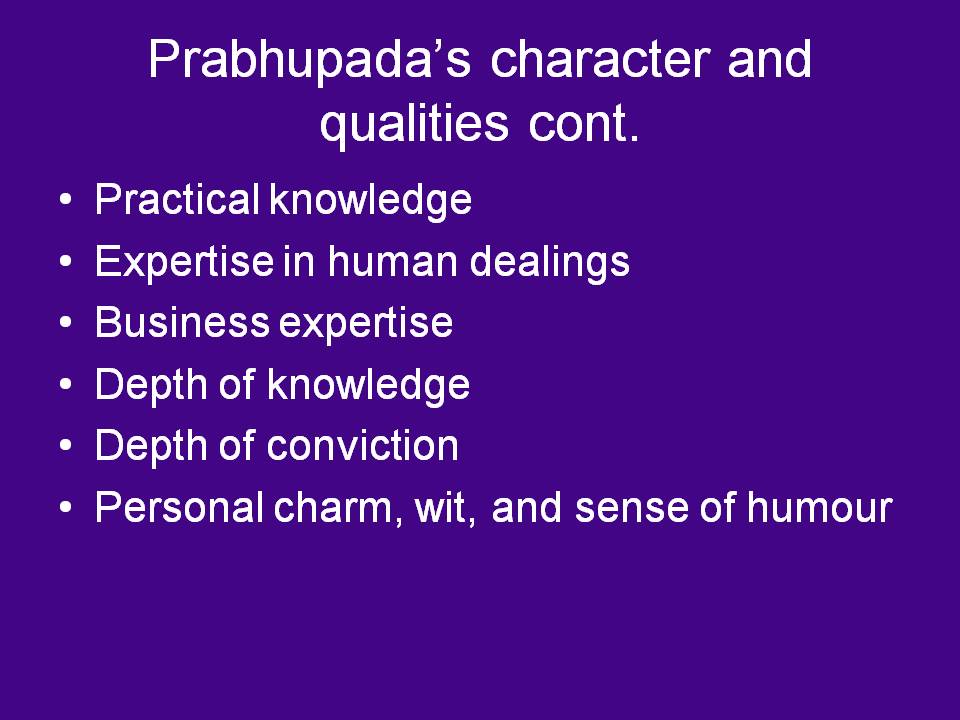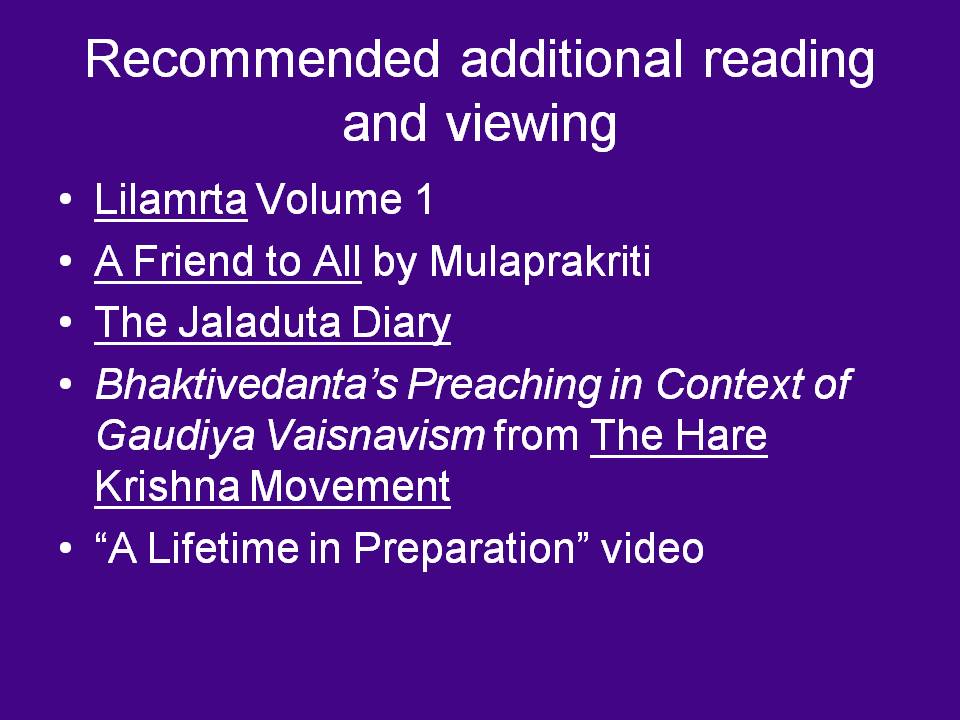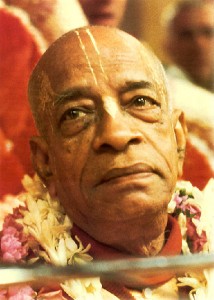
A.C. Bhaktivedanta Swami Prabhupada.
I humbly offer my respectful obeisances unto Om Visnupada Paramahamsa Parivrajakacarya Nitya Lila Pravista 108 Sri Srimad A.C. Bhaktivedanta Swami Srila Prabhupada, the life and soul of the International Society for Krishna Consciousness. Known affectionately as Srila Prabhupada.
His full life story can be found in the seven volume set entitled "Prabhupada Lilamrta" by His Holiness Satswarupa dasa Goswami. This in itself tells more than I could ever say.
His motto was, "Preaching is the essence, purity is the force, books are the basis, and utility is the principal." This graphically depicts the mood of Srila Prabhupada, and those who walk with him.
"The people of India could not recognise Srila Prabhupada very well when he was there, to their great misfortune. But, day by day we hear people say, 'how unfortunate I was, I didn't get Srila Prabhupada's 'darshan'. How great he is, he has spread this culture all over the whole world. No one has ever done that.'Day by day I'm hearing more and more people comment how much they are unfortunate that they failed to take the opportunity of Srila Prabhupada's presence. Actually Srila Prabhupada predicted that something like that would happen. That eventually everyone, from India, once all of India, then the whole world, they would realise how great this movement is, and how great Srila Prabhupada is to spread it all over the world. And the movement is still spreading by all of his powerful representatives, all of his Devotees! Just see!
"The people of India were so foolish, that even though Srila Prabhupada was present, he didn't put on such a big show, he didn't manufacture 'rasagulas'. He simply manufactured pure Devotees wherever he went. Which nobody can do! But the people they are more interested in the 'ashes', if somebody can create some ashes, that is very wonderful. I was in Jagannatha Puri and some 'sadhu' came up, and said, 'I am a 'sadhu' give me a flower'. So one Devotee gave him a flower, he went like this (closed his hand on it), opened his hand, there was ashes. 'Can I have some Rupees?' "What is the use??? So one is asking Rs. 2., and one is getting so many followers. The point is they are simply producing ashes, they are not producing a Devotee. They are not changing persons' heart!

Of course Srila Prabhupada is carrying out the same thing that Lord Nityananda started in Bengal 500 years ago. Lord Nityananda started the 'Nama-hatta', the market place of the Holy Name. Where everyone can come and get the Holy Name.
"So, Srila Prabhupada has changed, and his representatives, are changing the hearts of people all over the world. You see that is the real miracle. That is the real miracle!!! But people are so foolish that even today they are not able to understand what is miraculous, and what is cheap. But gradually they will understand. It took them ten years in Navadwip to understand (after Lord Chaitanya's leaving that place to take 'sannyasa'). So more the preaching goes, so more the people will come to understand."Of course Srila Prabhupada is carrying out the same thing that Lord Nityananda started in Bengal 500 years ago. Lord Nityananda started the 'Nama-hatta', the market place of the Holy Name. Where everyone can come and get the Holy Name. But the price of purchasing it isn't an ordinary 'pounds-shillings-and pence'. What is the price? The price is faith. The price is desire. If one has the faith to chant, the desire to take the mercy, that is the only price. So in this way Lord Nityananda sent out His representatives everywhere, to open up branches of the market. And this was in turn done by Bhaktivinoda Thakura, he wrote 'Anyone all over the world, they can be part of this transcendental market place of the Holy Name'; and of course Srila A.C. Bhaktivedanta Swami Prabhupada, he actually established the market places, all over the world. Any where there is a big Temple with so many Devotees, that is described as a bazaar. A Bazaar means where there are so many shops, so many opportunities to purchase the goods. So all these Temples, big Temples, they are like market places. A Devotee can come and get wholesale mercy. And where there are individuals, one or two, few Devotees, there is a shop where one can go. And then there's the travelling salesman. Travelling salesmen, they go from village to village, they carry the goods on their heads, and crying out: 'Anyone who is interested!' They give him the merchandise. It is described, there are two kinds of salesman. One kind takes the goods on credit and one buys, cash. The person who takes on credit, he takes the goods, goes and sells it, realises the profit, the money, returns the price of the goods and keeps the profit. The other person he's already got the capitol, he buys the goods cash, he goes out sells the goods, realises the profit. So like that some devotees, even they have not realised, even they may not have taken initiation, they may not of realised themselves what is the full nectar of devotional service. Still by taking the message from the bona-fide source, going out distributing it, then going back and getting some more mercy to give out, they realise their profit. They make their spiritual advancement. And some, even he is realised, even he's got a taste for chanting and hearing still the same thing, he takes the goods and distributes what is that merchandise, that's the pure Holy Name. Of course the pure Holy Name is existing in Srila Prabhupada's books, on every page, word by word, glorification of the Holy Name, form, pastimes of the Lord.
"So in this way everyone is taking part, some people are the employees of the this market-place, just like there's a treasurer; there's the man who weights the goods up; there's the 'coolie', who carries out the goods, throws them up, in the van; then there's the tailor, the barber and the washerman.
"In India these three types of people are considered very low. Especially the washerman, and the barber. The dirty jobs, cutting all the hair! But in the market place of the holy name these are the most important people, Yes. The tailor, they take so many pieces of cloth, stitch them together and make a garment. So the tailor, his job is to take so many different diverse ideas 'karma-yoga', 'jnana-yoga' 'bhakti!' He takes all different kinds of materialistic things he combines them together, [the] stitches [are] ‘time, place and circumstances’, [he] cuts the suit to engage the person in devotional service. And the barber is very essential, in the barbershop he's got the long hairs, and the beards. He cuts, and gets them all cleaned up. This is just like the 'new bhakta director' man comes in he's completely materialistic, and he's shaved up and preached to, he's cleaned up in his conceptions. In this way the barber takes the gross materialist, cleans them up, and brings them into devotional service, very important.
"But the most difficult task, I must admit, is actually the laundry man, the 'dhoba'. His job is very difficult. He takes all the dirty clothes with all the spilled chutney, 'dahl' and everything and has to make it spotless and clean. This is just like when a devotee is negligent in his devotional life and he 'bloops', he falls down or he becomes confused, and lacks enthusiasm. It means he's become coloured with materialistic desires, materialistic contamination. So the washerman, he takes such people, 'the fringies', 'the bloops' and he cleans them up and brings them back to the perfect line of devotional service, a most difficult task. It doesn't matter the devotional market place in the 'nama-hatta' everyone is engaged in the transcendental there's no consideration 'Oh this man's a washerman' Every engagement is very essential and important. So the thing is to immediately join Lord Nityananda's enterprise, His International, intercosmic, transcendental spiritual market, either as salesman or employee in the market or sweeper, cleaner or whatever it may be. Sweeper is the post that was taken by Bhaktivinoda Thakur, it's especially reserved for the Acarya. The sweeper has to always keep the market place clean, no nonsense, no dirt allowed to settle. Everything has to always be kept clean, no 'maya' allowed to enter. In the market place of the holy name the highest position which appears in the material view point to be most menial. Actually what is the duty of the 'guru', he's simply to see that there's no 'maya' enters into the disciple's mind. And that all the dirt is swept away. So he's a sweeper, he's a servant of everyone, but in the market place he's given respect by all the other devotees. So in this way this transcendental preaching is going on without cessation. It's going on eternally, constantly.
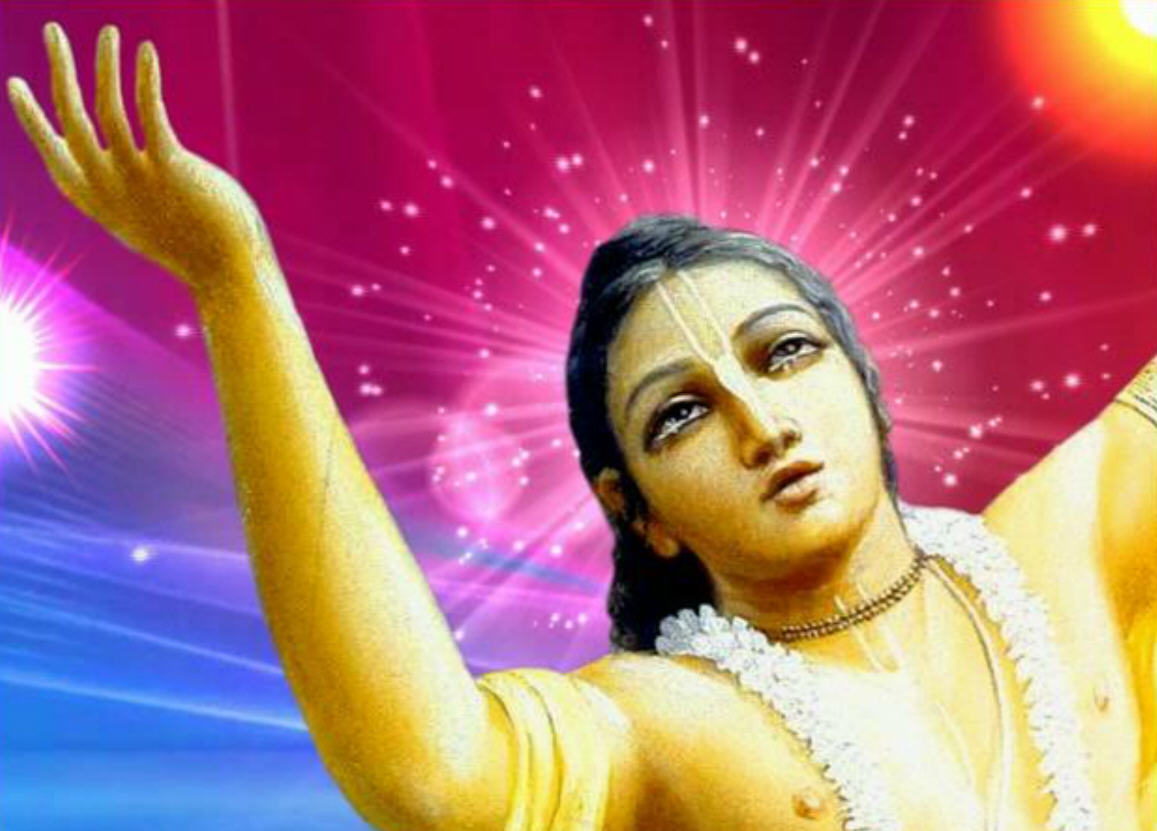
"I will inundate the entire universe with My love. Not a pinch of misery or lamentation will remain. I will freely give My ecstatic love to the demigods ('devas'), and all moving and non-moving living entities."(Sri Chaitanya Mangala, Lochan dasa Thakura; Mahanidhi Swami. 1994. page 48.)
"Srila Prabhupada, when he was walking through Vrindavana a 'rickshaw walla' got down off his 'rickshaw' and bowed down to Srila Prabhupada. Prabhupada said just see, this simple man, this 'rickshaw walla', how he's respecting a Vaishnava. This is the greatness of Indian culture. Unfortunately, most people see a dirty 'rickshaw walla' got off his 'rickshaw' and bowed down, what's the big deal? But Srila Prabhupada was overwhelmed that this simple person knows how to respect a Vaishnava. Where else in the world can you get any taxi driver get out and bow down to the 'acarya'. So this is the remnants of the glory of the Vedic culture which is still in India."(Jayapataka dasa Goswami. 29th August 1979. Srimad Bhagavatam class excerpt S.B. 3:29:45., Bhaktivedanta Manor, London.).
In regards to the different functions within the market-place of the Holy Name, Sri Chaitanya Mangala of Locan dasa Thakura Lord Chaitanya is recorded speaking the following words, which the members of ISKCON believe, although in some cases are general, specifically refer to Srila Prabhupada.
"In the Kali Yuga, However, I'll use the weapons of My transcendental Holy Names, qualities, and the potency of My 'prema-bhaktas' (pure devotees). With these I'll conquer the people's demoniac mentalities and award them pure devotional service to Radha and Krishna.
"Now without considering anything else, everyone just come with Me, and we'll destroy the sinful activities of the age of Kali. With the powerful chopper of 'nama-sankirtan' I'll cut the hard knots of demoniac desires from the hearts of everyone.
"Even the sinners reject or flee to foreign countries, still they will get the mercy. I will send 'mor senapati bhakta' to go there and deliver them.
[‘mor’ means My; ‘senapati’ means a military field commander, and ‘bhakta’ means devotee. So Lord Chaitanya will empower His own devotee to spread Krishna consciousness around the world.]
"I will inundate the entire universe with My love. Not a pinch of misery or lamentation will remain. I will freely give My ecstatic love to the demigods ('devas'), and all moving and non-moving living entities."(Sri Chaitanya Mangala, Lochan dasa Thakura; Mahanidhi Swami. 1994. page 48.)
Brahmananda: Oh, Bhavananda Maharaja, he knows. The astrologer in Mayapur?
Bhavananda: Oh, Mr… In Svarup Ganj there's one big astrologer. So he saw your photograph, and he said, 'This is the face of the most powerful spiritual personality on the planet.'
Prabhupada: (laughs) Hare Krishna.
Brahmananda: Then what else?
Bhavananda: Then he said that, 'I can tell from his face that he can make a house in which the whole world can live peacefully.'
Devotees: Jaya Prabhupada!
Prabhupada: At least I desire so. (break) Where your preaching was going on?
Tamala Krsna: We were preaching in Berkeley, California. Our other parties are spread out all over the country. One party is in"(Morning Walk Conversation, A.C.Bhaktivedanta Swami Prabhupada. 1st. July 1975. Denver.)
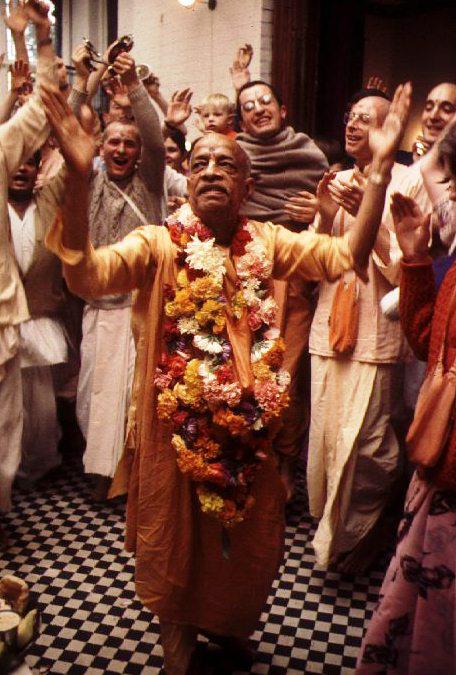
'I can tell from his face that he can make a house in which the whole world can live peacefully.'
Srila Prabhupada was born Abhay Charan De on September 1st 1896 in Calcutta, India. His father was Gour Mohan De, a cloth merchant, and his mother was Rajani. His parents in accordance with Bengali tradition, employed an astrologer to calculate the child's horoscope, and they were made jubilant by the auspicious reading. The astrologer made a specific prediction: When this child reaches the age of seventy, he would cross the ocean, become a great exponent of religion, and open 108 temples.(Satswarupa das Goswami. 1987. "Your Ever Well-wisher". page x.) It is noteworthy that in that very same year, 1896, Srila Bhaktivinoda Thakura's book was accepted into McGill University in Canada, a pilot light for preaching in the West.
When young Abhay had been unwilling to go to school, his father saw the humour in it, and always treated him kindly, and was lenient. His mother however, hired a man to escort young Abhay daily to school.
Gour Mohan De was also a pure hearted Vaishnava. He often used to take young Abhay to the local Sri Radha-Govinda Temple. Where young Abhay was seen to be stood for many long hours offering prayers before the Deity. "The Deity was so beautiful, with His slanted eyes". (A.C.Bhaktivedanta Swami Prabhupada; Satswarupa das Goswami. 1987. "Your Ever Well-wisher". page xiii.)
As Abhay grew up he became more and more devoted to the Deity form of the Lord. He was especially enamoured with the Jagannatha Rathyatra festival that was held in Calcutta each year. Hearing and understanding the significance of the festival Abhay would sometimes check railway timetables to go to Jagannath Puri where Lord Chaitanya personally attended some 500 years before. Every year a conservative estimated 5 million people attended the festival, this absorbed Abhay more in the mood of Rathyatra.
1901 (circa) Young Abhay conducts his very own first Rathayatra. His father making a small cart, three feet high with a canopy resembling closely the huge carts in Puri. All the local children and many adults would come. Abhay stood out as a leader even then, as he organised and engaged everyone, even many of the mothers were engaged by him in cooking, (especially his sister Bhavatarini), who all cooked special preparations to be offered and distributed as 'Prasadam' at this Rathyatra festival.
At age 6, his father purchased upon his request, his own Radha-Govinda Deities. Seeing the family engaged from his birth, watching his father performing the 'puja' at home, and going regularly to see Radha-Govindaji, it was only natural. From this day on whatever foodstuffs were brought before him by his parents, he would first offer to Sri Radha-Govindaji, and then eat Their 'prasadam'. He also used to daily offer them a ghee lamp, and properly put Them to rest at night. Little is know of his adolescence.
During his college years his father arranged a marriage, selecting Radharani Datta as Abhay's bride. In 1918 they were married, but for several years Abhay lived with his family and Radharani with hers as she was only 11 years old, and Abhay was 22 years of age. So as well as for obvious reasons, this was to facilitate his finishing his college education. As it was recognised that the added responsibility of supporting a family is a challenge.
In his fourth year of college Abhay felt reluctant to accept his degree, a degree that was given by the British. He had become a sympathiser to the Nationalist case, which advocated 'National schools', Freedom from British Rule, and Self Government (Self Rule).
At the same school (Scottish Colleges) in the class one year ahead of Abhay was the highly spirited Nationalist Subhas Chandra Bose, who later became the leader of the Indian National Army formed to overthrow British Rule of India.
Abhay was attracted to the pure and simple teaching of Mohandas K. Gandhi (Mahatma Gandhi). Who stood by the ancient pure principles of moral India, and regarded Bhagavad Gita above all other books. His personal habits too, and life-style were pure, as he lived a life as a saint, 'sadhu'. Abhay had seen many 'sadhus' and was not overly impressed. However, Gandhi had more integrity than most.
Gandhi called on all Indian students to rebel and give up British mundane, manipulative educations, that would ultimately bind one in slavery to the British Raj and would deny the Indian people of their freedom, religion, culture, and inevitably their country. The schools shaped the students, 'brainwashing' them to British Imperialism, teaching them the corrupted philosophies taught by the Christian Church funded Western Indologists shaping them for the control of generations to come.
Abhay weighed up the 'pros' and 'cons'. Abhay then rejected his diploma even after completing his fourth year and passing his examination. So doing he made his principled stand of protest in response to Gandhi's call.
When Gandhi called for a boycott of everything British and 'non-co-operation' after the British soldiers had gunned down hundreds of innocent, unarmed Indians who gathered at a peaceful rally at Jallainwalla Bagh, Abhay moved closer towards Gandhi's independence movement.
Abhay's father was somewhat disturbed for Abhay's future, but didn't resent his decision. More concerned for Abhay's future than Indian politics Gour Mohan De arranged employment for Abhay through a prominent friend, distinguished surgeon, and chemical industrialist, a Dr Kartick Chandra Bose. Dr Bose gladly accepted Abhay as his department manager in his firm.
1921 His wife gave birth to the first son and child, while she was just 14 years old (A.C.Bhaktivedanta Swami Prabhupada. June 8th 1974. Morning walk conversation. Geneva, Switzerland.).
1922 marked the first meeting of Abhay with his spiritual master. Some of Abhay Charan's friends were going to see a 'sadhu' who was preaching in Calcutta, a descendant in the Brahma Madhwa Gaudiya line coming through Bhaktivinoda Thakur, his father none less. The 'Scottish School' educated, and prestigious leader of his group of friends, was asked to come along too. At his family home Abhay Charan De had seen so many 'sadhus' come, his father a pure Devotee of the Lord, would daily invite 'sadhus' to his house for 'Prasadam', and as a general feeling Abhay was not overly impressed with what he saw. His friends knowing his devotion, learning and expectations, valued his opinion, and so insisted that he come and see Bhakti Siddhanta Saraswati Goswami. Abhay was reluctant, but his friends wanted his approval. So Abhay conceded to go.
"No sooner did Abhay and his friends respectfully bow before the saintly person and prepare to sit than he said to them, 'You are educated young men. Why don't you preach Lord Chaitanya's message throughout the whole world?' " (Satswarupa das Goswami. 1987. Your Ever Well Wisher. page xvi.)
Abhay was surprised that the 'sadhu' had asked immediately for them to become preachers on his behalf. Impressed by Srila Bhakti Siddhanta Saraswati Thakura he wanted to test him with intelligent inquiries" (Satswarupa das Goswami. 1987. You Ever Well-wisher. page xvi.)
Khadi clad, Abhay asked, "Who will hear your Chaitanya's message? We are a dependent country. First India must become independent. How can we spread India's culture if we are under British rule?"
Note that he never objected to the concept of spreading Lord Chaitanya's mission, his concern was with the apparent obstacles that stood in the way.
Srila Bhakti Siddhanta Saraswati dispelled any thought of potential obstacles saying that Krishna consciousness didn't have to wait for a change in Indian Politics, nor was it dependent on who ruled. Krishna consciousness could not be impaired by anyone or anything, it is so important that it could not wait. Therefore you must do it. Abhay was struck by his boldness. He brushed all temporal material miseries and condions aside, leaving the only worthwhile and factual conclusion and solution to all material difficulties, Krishna consciousness.
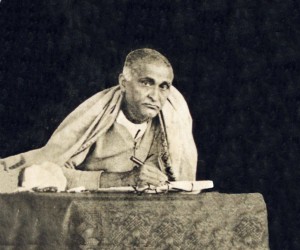
Srila Bhaktisiddhanta Saraswati Thakur Prabhupada.
In a very short time Abhay was convinced, "He's wonderful!" Abhay said to his friend, "The message of Lord Chaitanya is in the hands of a very expert person" (Satswarupa das Goswami. 1987. "Your Ever Well-wisher", page xvii.) It was that very night that in his heart young Abhay accepted Srila Bhaktisiddhanta Saraswati Thakur Prabhupada as his spiritual master (Satswarupa das Goswami. 1987. "Your Ever Well-wisher", page xvii-xviii).
In 1925 Abhay Charan De first visits Sri Vrindavan, the Holy place of Lord Sri Krishna's Pastimes.
For business purposes, Abhay and his wife and family moved to Allahabad. As a pharmaceutical salesman, Abhay did a lot of travelling by rail, especially in North India. By now Abhay Charan had developed a strong relationship with Srila Bhaktisiddhanta Saraswati Thakur Prabhupad, to the point where he requested formal spiritual initiation. On November 21st 1932., in the Gaudiya Math in Allahabad Abhay Charan De receives 'diksha' initiation.
Abhay tried to organise to visit his spiritual master but whenever he visited Calcutta Srila Bhaktisiddhanta Saraswati was not there. Unlike many of his other disciples Abhay was thus unable to travel and spend time with his spiritual master. Consequently over the next four years they only met about a dozen times.
When finally they did meet Abhay Charanaravinda das took every opportunity to hear from Srila Bhaktisiddhanta. "Although Srila Bhaktisiddhanta Saraswati was so strong in argument against other philosophies that even his own disciples were cautious about approaching him if he were sitting alone, and although Abhay's contact with him was quite limited, still Srila Bhaktisiddhanta Saraswati would always treat him very kindly. Srila Prabhupada would later recall, "sometimes my Godbrothers would criticise because I would talk a little freely with him, and they would quote this English saying, 'Fools rush in, where angels fear to tread'. But I would think, 'Fool? Well, maybe. But that is the way I am'. My Guru Maharaj was always very, very affectionate to me" (Satswarupa das Goswami. 1987. "Your Ever Well-wisher", page xx.)
1935 on the occasion of Srila Bhaktisiddhanta Saraswati's 62nd birthday Abhay submitted a poem and an essay at as meeting of his Godbrothers in Bombay. The articles were well received and duly published in the 'Harmonist' for which Abhay was informally daubed 'kavi' (learned poet) by his Godbrothers. Abhay's real pleasure in his offering was when it reached Srila Bhaktisiddhanta Saraswati, who in particular liked one stanza and showed it to all his guests:
Absolute is sentient
Thou hast proved,
Impersonal calamity
though has removed.
Later Srila Bhaktisiddhanta Saraswati said to the editor of the 'Harmonist', "Whatever he writes, publish it!"
That year (1935) held one of the most significant meetings with his spiritual master in Vrindavan. Once when Abhay Charanaravinda das was walking with Srila Bhaktisiddhanta Saraswati and several other disciples, Srila Bhaktisiddhanta Saraswati began talking confidentially to Abhay Charan das. The conversation was in regard to some senior disciples quarrelling over who would use various rooms and facilities at the Gaudiya Math headquarters in Calcutta (Bagh Bazaar). Srila Bhaktisiddhanta Saraswati said to Abhay Charan' if they are quarrelling now what will they do after their spiritual master passes away? Srila Bhaktisiddhanta Saraswati was distressed. He said to Abhay Charan' "There will be fire!" One day there would be fire in the Calcutta Gaudiya Math, and that fire of party interest would spread and destroy. Abhay Charan' heard, but didn't know what to make of it. "It would be better, to take the marble from the walls of the temple to secure money. If I could do this and print books, that would be better," said Srila Bhaktisiddhanta Saraswati.
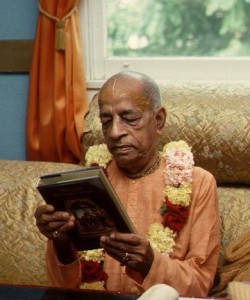
"It would be better, to take the marble from the walls of the temple to secure money. If I could do this and print books, that would be better," said Srila Bhaktisiddhanta Saraswati.
Then Srila Bhaktisiddhanta Saraswati said directly to Abhay Charan, "I have a desire to print some books. If you ever get money print books".(Satswarupa das Goswami. 1987. "Your Ever Well-wisher", page xxi.)
"Srila Bhaktisiddhanta Saraswati Thakur Prabhupad departed from this mortal world in December 1936. One month before his departure Abhay Charan wrote him a letter. He was thinking that as householder, 'grhastha' he couldn't fully serve his spiritual master, and he wanted to know what to do. Thus he inquired, "Is there any particular service I can do?"
Two weeks later Abhay Charan received a reply: "I am fully confident that you can explain in English our thoughts and arguments to the people who are not conversant with the languages Bengali & Hindi. This will do much good to yourself as well as your audience. I have every hope that you can turn yourself into a very good English preacher." (Satswarupa das Goswami. 1987. "Your Ever Well-wisher" page xxi.) Accepting this as his confirmation of his mission Abhay Charan began to further mould his life. "The fire in the math", mentioned by Srila Bhaktisiddhanta Saraswati broke out almost immediately after his disappearance. Legal disputes followed and the mission as propounded by Srila Bhaktisiddhanta Saraswati, was spoiled.
Srila A.C.Bhaktivedanta Swami Prabhupad lets his feelings be felt in the following Purports:
"In the beginning, during the presence of Om Visnupada Paramahamsa Parivrajakacarya Astottara-sata Sri Srimad Bhaktisiddhanta Sarasvati Thakura Prabhupada, all the disciples worked in agreement; but just after his disappearance, they disagreed. One party strictly followed the instructions of Bhaktisiddhanta Sarasvati Thakura, but another group created their own concoction about executing his desires. Bhaktisiddhanta Sarasvati Thakura, at the time of his departure, requested all his disciples to form a governing body and conduct missionary activities cooperatively. He did not instruct a particular man to become the next 'acarya'. But just after his passing away, his leading secretaries made plans, without authority, to occupy the post of 'acarya', and they split in two factions over who the next acarya would be. Consequently, both factions were 'asara', or useless, because they had no authority, having disobeyed the order of the spiritual master. Despite the spiritual master's order to form a governing body and execute the missionary activities of the Gaudiya Matha, the two unauthorised factions began litigation that is still going on after forty years with no decision.
"Therefore, we do not belong to any faction. But because the two parties, busy dividing the material assets of the Gaudiya Matha institution, stopped the preaching work, we took up the mission of Bhaktisiddhanta Sarasvati Thakura and Bhaktivinoda Thakura to preach the cult of Caitanya Mahaprabhu all over the world, under the protection of all the predecessor 'acaryas', and we find that our humble attempt has been successful. We followed the principles especially explained by Srila Visvanatha Cakravarti Thakura in his commentary on the Bhagavad Gita verse 'vyavasayatmika buddhir ekeha kuru-nandana'. According to this instruction of Visvanatha Cakravarti Thakura, it is the duty of a disciple to follow strictly the orders of his spiritual master. The secret of success in advancement in spiritual life is the firm faith of the disciple in the orders of his spiritual master. The Vedas confirm this:
yasya deve para bhaktir
yatha deve tatha gurau
tasyaite kathita hy arthah
prakasante mahatmanah
'To one who has staunch faith in the words of the spiritual master and the words of the Supreme Personality of Godhead the secret of success in Vedic knowledge is revealed'. The Krishna consciousness movement is being propagated according to this principle, and therefore our preaching work is going on successfully, in spite of the many impediments offered by antagonistic demons, because we are getting positive help from our previous 'acaryas'. One must judge every action by its result. The members of the self-appointed 'acaryas' party who occupied the property of the Gaudiya Matha are satisfied, but they could make no progress in preaching. Therefore by the result of their actions one should know that they are 'asara', or useless, whereas the success of the ISKCON party, the International Society for Krishna Consciousness, which strictly follows 'guru' and Gauranga, is increasing daily all over the world. Srila Bhaktisiddhanta Sarasvati Thakura wanted to print as many books as possible and distribute them all over the world. We have tried our best in this connection, and we are getting results beyond our expectations." (A.C.Bhaktivedanta Swami Prabhupada; Sri Chaitanya Charitamrta Adi lila 12:8. purport.)
asarera name ihan nahi prayoiana
are janibare kari ekatra ganana
"There is no need to name those who are useless. It matters the devotional market place I mentioned them only to distinguish them from the useful Devotees." (Sri Chaitanya Charitamrta Adi lila 12:11. text.)
dhanya-rasi mape yaiche patna sahite
pascate patna udana samskara karite
"Paddy is mixed with straw at first, and one must fan it to separate the paddy from the straw." (Sri Chaitanya Charitamrta Adi Lila 12:12. text.)
"This example given by Krishnadasa Kaviraja Goswami is very appropriate. In the case of the Gaudiya Matha you preach about Lord Chaitanya, one can apply a similar process. There are many disciples of Bhaktisiddhanta Sarasvati Thakura, but to judge who is actually his disciple, to divide the useful from the useless, one must measure the activities of such disciples in executing the will of the spiritual master. Bhaktisiddhanta Sarasvati Thakura tried his best to spread the cult of Sri Chaitanya Mahaprabhu to countries outside India. When he was present he patronised the disciples to go outside India to preach the cult of Sri Chaitanya Mahaprabhu, but they were unsuccessful because within their minds they were not actually serious about preaching His cult in foreign countries; they simply wanted to take credit for having gone to foreign lands and utilise this recognition in India by advertising themselves as repatriated preachers. Many 'swamis' have adopted this hypocritical means of preaching for the last eighty years or more, but no one could preach the real cult of Krishna consciousness all over the world. They merely came back to India falsely advertising that they had converted all the foreigners to the ideas of Vedanta or Krishna consciousness, and then they collected funds in India and lived satisfied lives of material comfort. As one fans paddy to separate the real paddy from useless straw, by accepting the criterion recommended by Krishnadasa Kaviraja Goswami one can very easily understand who is a genuine world-preacher and who is useless." (A.C.Bhaktivedanta Swami Prabhupada; Sri Chaitanya Charitamrta Adi Lila 12:12. purport).
1939 Abhay Charan prabhu in recognition for his devotional scholarship receives the honorary title 'Bhaktivedanta' from the Gaudiya Matha.
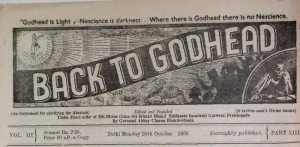
February 1944 A.C. Bhaktivedanta begins the 'Back to Godhead magazine', an English fortnightly magazine, single handedly.
February 1944 A.C. Bhaktivedanta begins the 'Back to Godhead magazine', an English fortnightly magazine, single handedly. Srila Prabhupada edited it, typed the manuscripts, checked the galley proofs, and even distributed the individual copies. Indian independence in 1947 was followed by the horrors of 'Indo-Pak' fighting. Hundreds of thousands died in the fighting that followed 'partition' of the land into India and Pakistan. Abhay Charan always remained in spiritual prospectus, reflecting Srila Prabhupada recalls, "We have seen in 1947, Hindu-Muslim fighting. One party was Hindu, the other party was Muslim. They fought, and so many died. And after death there was no distinction who was Hindu or who was Muslim – the municipal men gathered the bodies together in piles to throw them somewhere". (Satswarupa das Goswami. 1987. "Your Ever Well-Wisher", page xxiii.)
In regard to the problem Abhay Charan das presented a solution in BTG (Back to Godhead Magazine), in his article "Gandhi-Jinnah Talks", he wrote, "Fighting will go on between Hindu and Mohammedan, between Christian and Christian, between Buddhist and Buddhist 'till the day of annihilation".(Satswarupa das Goswami. 1987. "Your Ever Well-Wisher", page xxii.) As long as people forget their purpose in life and relationship with God and each other out of selfish material interests and desires for sense gratification, they will continue fighting. "Real unity was possible only on the platform of spiritual understanding and service to the Supreme".(Satswarupa das Goswami. 1987. "Your Ever Well-Wisher", page xxii.)
On December 7th 1947 Abhay Charan' wrote a long letter to Gandhi in New Delhi. Having doubts that Gandhi would ever receive it Abhay Charan addressing himself as Gandhi's "Unknown Friend", he wrote, "I tell you as a sincere friend that you must immediately retire from active politics if you do not desire to die an inglorious death". Abhay Charan never received a reply, and on 30th January 1948 Gandhi was shot to death, his letter appearing as a prophecy.
For the next few years Abhay Charan put less and less energy into business and more and more into writing and preaching.
Abhay Charan was invited to speak at the Gita Mandir in Jhansi by a colleague he had met as a customer at the Jhansi hospital. The audience was mostly students and professionals, who were mostly interested in social and cultural mental titillation. Many speakers came and went. But Abhay Charan was visionary and ambitious, and leaving his Allahabad business affairs in the hands of his son, he tried to start a spiritual movement there in Jhansi. This was "The League of Devotees".
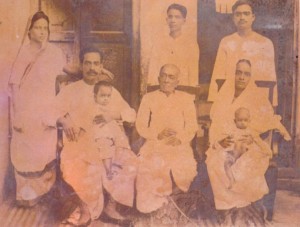
Family of Srila Prabhupada.
1950 he retired from family life, adopting the 'ashrama' of 'vanaprastha' (retired). He was far from retirement in actuality. Now he dedicated his energy into study and writing.
In 1953 initiates his first disciple in that centre in Jhansi, Acarya dasa.
Starts his own centre in Jhansi, to which the Grand Opening for 'The League of Devotees' was on May 16th.
The 1950's were a difficult time for Abhay Charan. He had to leave his "League if Devotees" building because the governor's wife insisted it be used for a "Ladies Club". With no place to stay and no real support, he left Jhansi – but not his plan for a world wide association of Devotees. He moved around from an 'ashram' in Delhi, stayed with different Godbrothers, now he knew he was on his own. He lived like a mendicant, staying here and there for a week at a time in various temples or in the homes of the wealthy pious people who would receive him. These difficult times of no money, simple clothing, little proper food, etc., made him more resourceful. He took these difficulties as assets. (Satswarupa das Goswami. 1987. "Your Ever Well-Wisher", page xxix.) Not so much in material terms, but in term of what it did for his faith. He had no-one, he was alone. Rejected by family and friends as a material failure his only solace was the mission of his spiritual master.
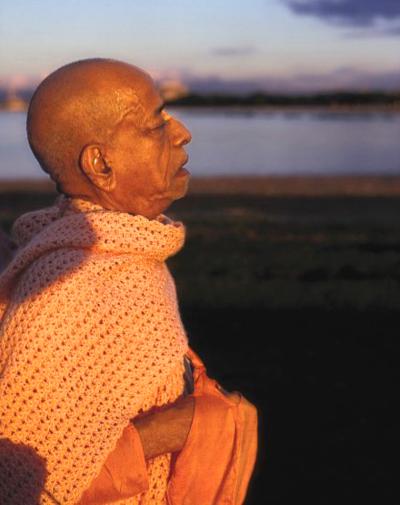
He had no-one, he was alone. Rejected by family and friends as a material failure his only solace was the mission of his spiritual master.
To fulfil this mission he approached many prominent personalities including Dr Rajendra Prasad, the President of India at that time, but received no reply.
In September of 1956, Abhay Charan moves to Sri Vrindavan Dham eighty miles south of Delhi to begin an intensive preparation and study to embark on his life's mission. His plan was to draw enough energy from the well of spiritual purity and energy of Sri Vrindavan Dham, write in the tranquil atmosphere and then commute to Delhi to distribute his literature and seek donations from respected persons.
Having full faith in guru and Krishna, always expecting their mercy, daily Abhay Charan pushed on even in the 60 degree Centigrade heat of the Vrindavana and Delhi summers. Living simply, in an inexpensive room in the Vamsi-Gopalji Temple, located on the bank of the sacred Yamuna River, he entered into a special mood, and quality of Vrindavan life.
It was very difficult, commuting to Delhi on the early morning train, but having nowhere to stay, returning to Vrindavan the same night. It didn't leave but a few hours in Delhi, and everything was so expensive, for one on a budget of next to nothing. Yet he continued, travelling, printing and mailing. After producing 12 consecutive fortnightly editions of "Back To Godhead" Abhay Charan ran out of money. The printer told him that he couldn't print simply out of friendship, and so there was no more publication. Abhay Charan continued writing, building up a stock-pile of preaching materials, but the plan for publication was distant.
After many years of struggle to support and maintain his family, finally in 1954, A.C. Bhaktivedanta prabhu leaves his family to dedicate his life to the mission of fulfilling the order of his spiritual master.
He ventured again to preach in Delhi. Resolute in his definite major purpose A.C.Bhaktivedanta prabhu sat in his Chippiwada Temple (Delhi) typing by day and night in order to present Shrimad Bhagavatam faithful to the Vedanta Sutra of Vyasa, and with purports to affect the stone like hearts of the misdirected civilisation presently inhabiting the Earth. Srila A.C.Bhaktivedanta prabhu carefully and thoughtfully with exacting care and concentration worked quickly to this end.
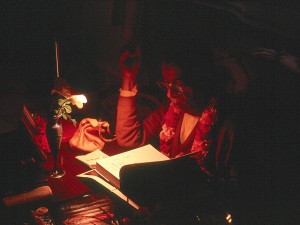
Resolute in his definite major purpose A.C.Bhaktivedanta prabhu sat in his Chippiwada temple (Delhi) typing by day and night in order to present Srimad Bhagavatam faithful to the Vedanta Sutra of Vyasa, and with purports to affect the stone like hearts of the misdirected civilisation presently inhabiting the Earth.
After some time moved to the Radha-Damodar Temple in town. There he would eat, sleep and write in his humble rooms overlooking the courtyard at the Sri Sri Radha-Damodara Temple, where the six Goswamis, four hundred years previously, would sit and take 'Prasadam' and discuss Vaishnava philosophy and the loving pastimes of Sri Radha Krishna in the presence of Lord Chaitanya. At this sacred place, the home of Gaudiya Vaishnavism, Srila Prabhupada, by the mercy of the 'parampara', became surcharged. His conviction, and mission to write and preach becomes more apparent, with much deep reflection upon his role, and the method by which he would fulfil that role.
Living at the historic Sri Radha-Damodar Temple in Vrindavana he began his monumental 'life's masterpiece' the multi volume commentated translation of the eighteen thousand verse Srimad Bhagavatam (Maha-Bhagavat Purana).
Reflective, and in a renounced and solitary mood, Abhay Charan Bhaktivedanta prabhu composed a Bengali poem, entitled, "Vrindavan Bhajan". Its opening stanzas were especially self-reflective and personal:
Verse 1.
"I am sitting alone in Vrindavana Dham. In this mood I am getting many realisations. I have wife, sons, daughters, grandsons, everything. But I have no money, so they are a fruitless glory. Krishna has sown me the naked form of material nature; By His strength it has all become tasteless to me today, 'yasyaham anugrhnami harishye tad-dhanam shanaih' "I gradually take away all the wealth of those upon whom I am merciful".
How was I able to understand this mercy of the All Merciful?
Verse 2.
"Everyone has abandoned me, seeing me penniless wife, relatives, friends, brothers, everyone. This is misery, but it gives me a good laugh. I sit alone and laugh!
In this 'Maya samsara', whom do I really love?
Where have my loving father and mother gone now?
And where are all my elders, who were my own folk?
Who will give me news of them, tell me who?
All that is left of this family life is a list of names.
(Satswarupa das Goswami. 1987. "Your Ever Well-Wisher", page xxxi).
Soon after this realisation Abhay Charan Bhaktivedanta prabhu had a striking repetitive dream, one that he had as a householder. In the dream his spiritual master appeared, just as he knew him, a tall, scholarly 'sannyasi', 'Vaikuntha man', the pure representative of the Lord. Srila Bhaktisiddhanta Saraswati Thakur indicated to Abhay Charan that it is time now to take 'sannyasa'. Repeatedly he called and motioned to the cloth. He was definitely asking Abhay Charan to take to the 'sannyasa' order.
When Abhay Charan awoke he pondered carefully the dream. "Abhay Charan dasa reasoned that his spiritual master was saying 'now take sannyasa and you will actually be able to accomplish this mission. Formerly the time was not right'." (Satswarupa dasa Goswami. 1987. "Your Ever Well-Wisher", page xxxiv.)
Humbly Abhay Charan (Bhaktivedanta prabhu) although apprehensive, approached his senior godbrother, Srila Bhakti Prajna Keshava Maharaj in Mathura, who stressed that Abhay Charan take 'sannyasam' immediately.
September 17th 1959, he receives formal 'sannyasa' initiation in Mathura from Srila Bhakti Prajna Keshava Maharaj, a dear godbrother and senior disciple of Srila Bhaktisiddhanta Saraswati Thakur Prabhupada. He was given the suffix Goswami to his name, and so carried the full name A.C. Bhaktivedanta Swami.That day he was horned by a bull in the market place, and took it as purification after the initiation.
In the Autumn of 1959, "Srila Prabhupada was living in Sri Vrindavan Dham and would sometimes practice 'madhukari'. 'Madhukari' means to collect a little food door-to-door for one's maintenance just as a bee collects a little pollen flower-to-flower. Srila Prabhupada, however, often requested the householders whom he called upon to give pen and paper for his writing rather than the rice, dahl, and chapattis traditionally sought by holy men practicing 'madhukari'.
On those papers that he received as alms, Srila Prabhupada wrote page after page, preparing his messages of Godhead for the world. Some of his manuscripts he published in his 'Back to Godhead Magazine', and others, like 'Easy Journey to Other Planets', he printed as small booklets. Although unable to publish everything he wrote, Srila Prabhupada nevertheless continued to write and stockpile his manuscripts. Unfortunately, some of the early writings of His Divine Grace were lost after Srila Prabhupada left Sri Vrindavan Dham to conduct his worldwide campaign of spreading Krishna consciousness." (J.G. Bhaktigaurava Narasingha Swami. 1993. Introduction to 'In Search of the Ultimate Goal of Life'. page xv.)
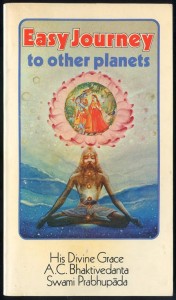
A.C. Bhaktivedanta Swami publishes his first book 'Easy journey to other planets' in Delhi in the autumn of 1960.
Following the mood of the day, acknowledging the world struggle and control between the 'post war super powers' for the 'uncharted, unknown realm of space', and understanding the mentality of the people of the day A.C. Bhaktivedanta Swami publishes his first book 'Easy journey to other planets' in Delhi in the autumn of 1960.
As a culmination of many years of study, reflection, meditation, discussion, and thought A.C. Bhaktivedanta Swami publishes Canto One, Volume One of Srimad Bhagavatam a commentary with super condensed, compacted purports which were the crystallised product of a life times study and realisation.
From his small room at the Radha-Damodar temple, where he would prepare his meals, and rest he could see the 'samadhi' of Srila Rupa Goswami and the Deities that he installed there. Bhaktivedanta Swami prayed there, at the feet of Rupa Goswami, his predecessor for guidance. what he received in return, the inspiration, intimate direction, was like the scribe Ganesh who wrote on Srila Vyasadeva's behalf as Vyasa dictated to him.
In 1962, with his Srimad Bhagavatam now published he personally travelled, preached its glories, and sold copies. Using favourable reviews from prominent persons like: Hanuman Prasad Poddar (Gita Press – Gorakpur), Hindu philosopher Dr Radhakrishnan, the prestigious 'Adyar Library Bulletin', Scholarly Godrothers, Prime Minister Lal Bahadur Shastri, Dr Zakir Hussain – the Vice President of India, Sri Biswanatha Das – governor of Uttar Pradesh, as his advertisements. Bhaktivedanta Swami visited prospective donors as he tried to raise funds for further volumes. To publish the first canto in three volumes it had thus taken a little more than two years.
Now he turned his attention to preaching in the West.
Srila A.C. Bhaktivedanta Swami was 69 years of age. He had treasured, nurtured and developed the instruction from his spiritual master some forty years. It seemed a long cultivation and preparation. As Satswarupa das Goswami so nicely calls his biography on Srila Prabhupada's first volume "A life-time in preparation", preparing to plant the seeds.
"In Vrindavan Bhaktivedanta Swami met Mr Agarwal, a Mathura businessman, and mentioned to him on passing, as he did to almost everyone he met, that he wanted to go to the West. Although Mr Agarwal had known Bhaktivedanta Swami for only a few minutes, he volunteered to try to get him a sponsor in America by asking his son Gopal, an engineer in Pennsylvania, to send back a sponsorship form. When Mr Agarwal volunteered to help in this way, Bhaktivedanta Swami urged him to please do so" (Satswarupa das Goswami. 1987. "Your Ever Well-Wisher", page xxxviii.)
Meanwhile A.C. Bhaktivedanta Swami went about his daily affairs following his usual avenues of book selling, looking for whatever opportunity might arise. Then one day to his pleasure and surprise, he was contacted by the Ministry of External Affairs and informed that a certificate of 'No Objection' for travelling to the U.S was ready. Mr Gopal Agarwal of Butler Pennsylvania had solemnly declared that he would bear any and all expenses of Bhaktivedanta Swami during his stay in the United States.
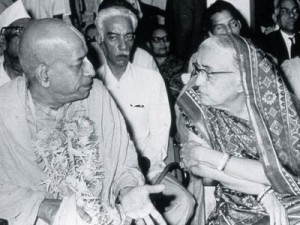
Meeting Sumati Morarji - owner of the steamship company.
With newly acquired passport, visa, 'P-form', sponsor, and travel fare A.C. Bhaktivedanta Swami travelled to Bombay to seek assistance in getting to America. He approached Srimati Sumati Morarji, head of the Scindia Steamship Line, who had previously helped him with a large donation for printing volume two of Srimad Bhagavatam. Concerned to his health and welfare Sumati Morarji said, "no" to his request for assistance.
Bhaktivedanta Swami coaxed her secretary Mr Choksi, advising him in exactly what to say: "I find this gentleman very inspired to go to the States and preach Lord Krishna's message to the people there " again she said, "no". He demanded a personal interview, which he got, and then presented his single minded emphatic request: "Please give me one ticket!"
Finally she conceded and gave him a scheduled place on the ship Jaladuta, which was sailing from Calcutta on 13th August 1965. She made all the arrangements, making sure that he would travel on a ship whose captain understood the needs of a vegetarian and a 'brahmana'. She organised that the captain, Arun Pandia carry extra vegetables and fruits for Bhaktivedanta Swami.
A couple of days before the ship was to sail Bhaktivedanta Swami arrived in Calcutta. Although he had spent so much of his early life growing up there and had known so many persons as in his poem, now he knew no-one. Staying with a slight acquaintance, and on the day before his departure, travelling north to Mayapur to visit the 'samadhi' tomb of his spiritual master Srila Bhaktisiddhanta Saraswati Thakura Prabhupada to ask for his blessings. Now he was ready.
His main baggage was several trunks, two hundred three volume sets of first canto Srimad Bhagavatam, his personal baggage a small suit-case, an umbrella, and a supply of dry cereal in case he couldn't find food in the land of the meat eaters. If that be the case, he was prepared to live on boiled potatoes and the cereal he brought with him.
On Friday August 13th 1965., at 9:00 am, he sets sail for America aboard the steamship 'Jaladuta'. By Saturday 14th, Bhaktivedanta Swami experienced seasickness, dizziness, vomiting as they moved slowly in heavy rains through the Bay of Bengal.
Reaching Colombo, Sri Lanka on 19th, Bhaktivedanta Swami was able to go ashore and get some relief from his seasickness. A diary is recorded of the exact route in Satswarupa das Goswami's books in the chapter "Struggling Alone" (Satswarupa das Goswami. 1987. "Your Ever Well-Wisher", pages 1-3.)
After experiencing sea-sickness from the Atlantic crossing, in rough seas, and in mid-Atlantic, and at the advanced age of 63 years of age A.C. Bhaktivedanta Swami suffers two heart attacks. "If a third comes I will not survive!"
That night in a dream the Lord appeared to him in a boat full of many incarnations, and assured the dedicated mendicant that He will protect him.
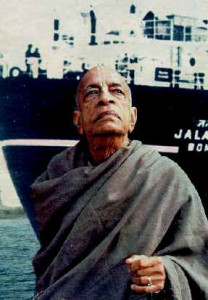
"If the Atlantic would have shown its usual face, perhaps I would have died. But Lord Krishna has taken charge of the ship".
Sri Krishna was very kind to Srila A.C. Bhaktivedanta Swami, and he appreciated that. In his diary he wrote, "If the Atlantic would have shown its usual face, perhaps I would have died. But Lord Krishna has taken charge of the ship".
After a 35 day journey from Calcutta the Jaladuta docked at Commonwealth pier at 5:30 am, September 17th 1965, the ship docks in Boston, United States of America, stopping briefly before pushing on to New York City Harbour, for A.C. Bhaktivedanta Swami a new journey had begun.
The Captain made comments to the effect that, this had been the calmest of all the Atlantic crossings that he had ever been on, and light heartedly, yet with regard for his health, asked Bhaktivedanta Swami if he would return with him to ensure another safe trip.
With only forty Rupees, and an Indian steel trunk full of Srimad Bhagavatams, A.C. Bhaktivedanta Swami set his sights for creating a movement that would have the effect of changing the world that we live in so many ways.
Unlike many Indians who had gone before him and come to the West, he had not come to receive from the West, but had come to give to the West!
He was staunch. In an uncompromised manner, with shaven head, 'Vaishnava tilak', Tulasi neck beads, saffron 'dhoti', 'kurta', 'uttara' and an old 'chaddar' – shawl; and rubber pointed slippers, all not uncommon for 'sadhus' in India. But who in America had ever dreamed of seeing anyone dressed in the traditional Vaisnava way? "He was possibly the first 'Vaishnava sannyasi' to arrive in New York with uncompromising appearance" (Satswarupa dasa Goswami. 1987. "Your Ever Well-Wisher", page 5.)
Srila Prabhupada recalls, "I did not know whether to turn left or right" (Satswarupa das Goswami. 1987. "Your Ever Well-Wisher", page 5.) After passing through the dockyard formalities he was met by a representative from travellers aid, sent by the Agarwals' in Butler Pennsylvania.
He stayed there for a while, always meditating on how best to preach. With a burning desire to start his preaching movement he got Gopal Agarwal to take him to Pittsburg where he got a bus for New York City.
A.C. Bhaktivedanta Swami knew no-one in New York, he only had a contact: Dr Ramamurthi Mishra. Dr Mishra was a flamboyant, dramatic personality. Bhaktivedanta Swami was given a room at his apartment, but when it became inconvenient he shifted Bhaktivedanta Swami down to his Hatha Yoga studio near Central Park. Bhaktivedanta Swami stayed there for a short time, but found himself constantly at odds with Mishra who turned out to be a 'mayavadi'.
In Butler he had been confined by the Agarwals' middle class sensibilities; now due to having to be temporarily dependent on the good will of a 'mayavadi' treated with kindness, yet viewed as a threat. Dr Mishra tried desperately hard to keep his 'yoga' students away from the personalistic philosophy emanating from Bhaktivedanta Swami's mouth.
November 8th, 1965, Bhaktivedanta Swami wrote to his godbrother Tirtha Maharaj, who had become president of the Gaudiya Math. He tried to urge his godbrothers to come and help him, or at least send a couple of men he could work with, preach with and open a centre with.
Three weeks later a reply came from Tirtha Maharaj, unfortunately today, I think for him, Tirtha Maharaj's letter was a very polite yet to the point, "that the Gaudiya Math's funds could not be used to open a centre in New York".
That didn't deter him in the least, his faith in the mission of his guru maharaj was firm, he knew what he wanted and knew that all he had to do was be willing to follow the design of the Lord. the practical example of Arjuna was there in the forefront of his mind, trusting that the battle was in fact already won, the humble follower of this ageless tradition now stood up proudly amidst numerous potential foes and declared the battle won. Proof of the foresight of his faith, like one who puts faith in the darkness of the early morning, knowing that light of day will appear, he revealed his mind to those he met, who he found worthy.
"In his solitary wanderings in Manhattan, Bhaktivedanta Swami made acquaintances with a number of local people. there was Mr Ruben, a Turkish Jew, who worked as a subway conductor. Mr Ruben met Bhaktivedanta Swami on a park bench and, being a sociable fellow and a world traveller, sat and talked with the Indian holy Man.
Mr Ruben: He seemed to know that he would have temples filled with devotees. He would look out and say, 'I am not a poor man, I am rich. There are temples and books, they are existing, they are there, but time is separating us from them'. He always mentioned 'we' and spoke about the one who sent him, his spiritual master. He didn't know people at that time, but he said, 'I am never alone'. He always looked like a lonely man to me. That's what made me think of him like a holy man, Elijah, who always went out alone. I don't believe he had any followers."(Satswarupa dasa Goswami. 1987. "Your Ever Well-Wisher", page 14.)
Even in the severest conditions of blizzards and snow Bhaktivedanta Swami worked on his "Krishna Book", Srimad Bhagavatam, preached from Bhagavad Gita and offered his food to the Lord.
15th February 1965, Bhaktivedanta Swami moved from Dr Mishra's 'yoga' studio to an place of his own, a small narrow office without furniture or telephone. Sleeping on the floor on blankets, and a makeshift desk for writing made by covering a trunk with a cloth. There were no bathing or cooking facility so he travelled up to flights to use Dr Mishra's 'Yoga Ashram'. Now Bhaktivedanta Swami maintained himself simply by selling his books to who ever he met that was interested.
Even in this bare room Bhaktivedanta Swami began to preach. On a donated reel to reel tape recorder he recorded some of his solitary 'bhajans', accompanying himself on 'karatals' (hand cymbals). He even recorded a long philosophical essay, "Introduction to Gitopanishad (Bhagavad Gita)". Srila Bhaktisiddhanta Saraswati had told him, "…and even if no one attends, you can go on chanting to the four walls". Now uninhibited by those around him, and free to speak, Bhaktivedanta Swami began lectures Mondays, Wednesday, and Fridays to whoever would come. His first audience were Dr Mishra's students that he had preached to at their 'ashram'. But news soon spread like fire in the Lower East Side of New York, the time was right and so were the people.
After having his typewriter and tape recorder stolen, disappointed, Bhaktivedanta Swami moved to the Bowery to be where the people were, and where he was offered accommodation in a loft.
The classes continued, and the musicians of the area came to chant along with Bhaktivedanta Swami, as long as they chanted 'Hare Krishna' he didn't mind.
But alas the nature of the Bowery's drug using population convinced Bhaktivedanta Swami that as he was warned, the Bowery was unsafe for a gentleman such as he.
Gaining assistance from some of his students Bhaktivedanta Swami stayed with Carl Yeargens and his wife Eva, until Michael Grant Carl helped him to find a store front, a former gift shop on 26 – 2nd Avenue, called "Matchless Gifts". The rent was $71 a month and including bond, electricity etc., it came to $196 to move in. Carl, Mike and some of the others pitched in and Bhaktivedanta Swami was able to move in. The apartment was painted, electricity connected, water turned on, and a phone installed everything paid for by his friends.
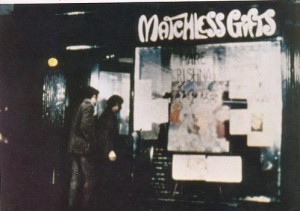
Gaining assistance from some of his students Bhaktivedanta Swami stayed with Carl Yeargens and his wife Eva, until Michael Grant Carl helped him to find a store front, a former gift shop on 26 - 2nd Avenue, called "Matchless Gifts".
The musicians and people of the Bowery considered Bhaktivedanta Swami "Highly Evolved", and felt inspired when it was time to move him into his new place. (Satswarupa das Goswami. 1987.) He was pleased to be there too, and seeing things slowly but surely coming together encouraged the mission of his spiritual master to keep going on.
The time was right, things were radically changing in the west. The youth were looking for the positive alternative, something to give lasting peace after decades of war.
Now finding himself strategically placed by the Lord ready to receive the influx of potential spiritual seekers, who had come from all over the U.S. to descend on the Lower East Side, "Which in the parlance of the renting agents became known as the 'East Village'." (Satswarupa dasa Goswami. 1987. "Your Ever Well-Wisher", page 34.) Their search was unlike other immigrants to the area, their's was a search not for work or acceptance by material society. Their's was a search to find real love, real peace, real existence, integrity, and ultimately real spiritual consciousness. They had rebelled against the war in Vietnam, political manipulation, T.V. propaganda, the trivia, and mundane advertising, and influence of the media – in fact they rebelled against everything that the ephemeral goals of 'middle class America' whence they came stood for. "They were disillusioned by parents, teachers, clergy, public leaders, and the media they were just right for spiritual life." (Satswarup das Goswami. 1987. "Your Ever Well-Wisher", page 34.) Sometimes, with his usual visionary and humble outlook, he would declare that they had been placed there by his 'guru maharaj' to assist with his preaching.
With complete disregard for his own safety he went to a place that Vaisnavas normally find distasteful, the most materially successful place, but a land of passion and ignorance, beset with crazy misguided youth and demoniac scientists, and where intoxication, illicit sex, and cow killing were a way of life. Sri Meanwhile A.C. Bhaktivedanta Swami went about his daily affairs following his usual avenues of book selling, looking for whatever opportunity might arise. Then one day to his pleasure and surprise, he was contacted by the Ministry of External Affairs and informed that a certificate of A.C. Bhaktivedanta Swami, at an age when most elderly gentlemen would be thinking of rest and retirement, started a revolution that has, without any doubt, changed the face of the earth.
aitam sa asthaya paratmanistha madhyasitam purvatamairmaharsibhih aham tarisyami durantaparam tamo mukundanghri nisevayaiva
"Following in the lotus footsteps of the great 'rshis' [we shall cross], he has crossed over the impassable ocean of the material existence by means of devotion to the Supreme Lord and by the transcendental service of Lord Mukunda, the Lord of liberation."
The pure unalloyed Vaishnavas like Srila Prabhupada always act in a way that is pleasing to the Lord and in no other way, as in the case of Lord Chaitanya's servant, who, after Lord Chaitanya fell asleep across the doorway of the room, stepped over His body to perform devotional service for the Lord. Upon Lord Caitanya's waking he saw that His dear servant was still in the room and had not taken his meal. Lord Caitanya enquired why he had not gone for his meal, and the devotee replied that he couldn't as You, the Lord were sleeping, blocking the door. The Lord further enquired saying, "How then did you enter the room?" The devotee replied that, "I had stepped over You so I could do some service for You, but for my service, service of my tongue and belly, I could not cross over You as this would be an offence." There are many stories like this in the Srimad Bhagavatam. One story relates how, at one time, Lord Sri Krsna played the part of having a headache. He stated that the only medicine was to take the dust from the lotus feet of the 'brahmanas', and so approached the 'brahmanas' in that way. Thinking for their own welfare and not for Krsna's, they all said that if they were to allow the Supreme Lord to take their feet on His head, they would all go to hell, never to return. However, when Krsna approached the 'gopis', the simple cowherd girls of Vrndavana with the same request, without hesitation gave Krsna their feet and He placed them on His head. Their thoughts are recorded as, "We don't care if we go to hell. Let us satisfy our Krsna. If Krsna is suffering we will do anything we can to relieve Him."
Another time in Jagannatha Puri Temple, which gets very full, an old lady climbed onto the body of Sri Chaitanya Mahaprabhu to see the forms of Lord Jagannatha, Baladeva and Lady Subhadra. Many Devotees were perplexed, but Sri Chaitanya Mahaprabhu could see her deep love for the Lord, and thus allowed her to do so. Another is in the case of Lord Krishna Himself, who broke His promise to save His Devotee Arjuna. When grandfather Bhisma attacked Arjuna, Krishna ran at Bhishma to crush him with a chariot wheel, even though He had said He would not intervene in the battle. Yet for His Devotee He gave up His reputation. So in the same way, as a spotless 'paramahamsa Vaishnava sannyasi' of the Lord "our Srila Prabhupada", for the service of the Lord and for the service of mankind and all living entities, took up the preaching mission as laid down by the Personality of Godhead, Lord Chaitanya Mahaprabhu, at the risk of his own personal safety and comfort.
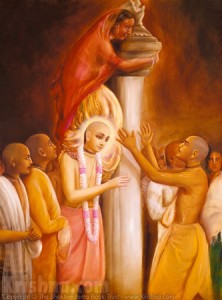
A lady who climed up on Lord Chaitania in order to see Lord Jagannath.
Srila A.C. Bhaktivedanta Swami was never concerned for the petty criticisms of the caste conscious 'smartas' and 'gosais', or others who never preached to try to lessen the suffering of the living entities in this world, for his turning those born outside of the 'Hindu' caste of 'brahmin' into sincere 'Vaisnava brahmins'. Rather he strictly followed the higher principal of compassion to all the conditioned souls, as spoken by Sri Caitanya Mahaprabhu;
bharata-bhumite haila manusya janma yara
janma sarthaka kari kara para upakara
"One who has taken his birth as a human being in Bharata Bhumi (India) should make his life successful and work for the benefit of all peoples outside India as well as in India."
ateva saba phala deha 'yare tare
khaiya ha-uk loka ajara amare
"Distribute this Krishna consciousness movement all over the world. Let people eat these fruits of love of Godhead and ultimately become free from old age and death." (Chaitanya Charitamrta Adi Lila 9:39.).
atheva ami ajnadilvn sabakare
yahan tahan prema-phala deha 'yare tare
"Therefore I (the Supreme Personality of Godhead Lord Sri Krishna Chaitanya Mahaprabhu) order every man within this universe to accept this Krishna consciousness movement and distribute it everywhere." (Chaitanya Charitamrta Adi 9:35-36.)
Even at the cost of his own reputation, expense, safety and health.
The 'shastric' injunctions that the many rigid 'smartas' quote are it's true there for our guidance and safeguard. The context however needs to be examined, and then applied to practical application as in the way of it's intent. In reality the sum and substance of these injunctions restricts the movements of purified or pure Devotees outside of 'karmabhumi' (India) to safeguard them from the undesirable lifestyles of the non-devotees, and barbarian carnivores who pervade such places, least not only their Vaishnava principles be threatened but also their lives. Specifically the west is referred to as 'bhogabhumi' meaning a place of unrestricted sensual exploitation and enjoyment.
We can see though, that such a strong willed, pure hearted and dedicated person as Srila Prabhupad never ever became affected by the lesser influences of the material energy. Rather 'Mayadevi' stands hands folded as the assistant of her Lord and master (Sri Krishna) to help and guide such a pure Devotee.
"We shall call our society I.S.K.C.O.N. Bhaktivedanta Swami had laughed playfully when he had first coined the acronym". He had initiated the legal work of incorporation that spring, while still living on the Bowery, but even before its legal beginning, he had been talking about his "International Society for Krishna Consciousness", and so it had appeared in letters to India and in "The Village Voice" (newspaper). A friend had suggested a title that would sound more familiar to Westerners "International society for God Consciousness". But 'God' was a vague term, whereas 'Krishna' was exact and scientific; 'God Consciousness' was spiritually weaker, less personal. And if Westerners didn't know or understand that Krishna was God, then the 'International Society for Krishna Consciousness' would tell them, by spreading His glories 'in every town and village'.
'Krishna Consciousness' was Bhaktivedanta Swami's own rendering of a phrase from Srila Rupa Goswami's Padyavali, written in the 16th century. 'krsna-bhakti-rasa-bhavita': "To be absorbed in the mellow taste of executing devotional service to Krishna'.
The purposes stated within ISKCON's articles of incorporation reveal Bhaktivedanta Swami's thinking. There were seven points, similar to those given in the prospectus for The League of Devotees, he formed in Jhansi, India 1954. That attempt had been unsuccessful, yet his purposes remained unchanged.
Seven Purposes of the International Society for Krishna Consciousness.
(a) To systematically propagate spiritual knowledge to society at large and to educate all peoples in the techniques of spiritual life in order to check the imbalance of the values in life and to achieve real unity and peace in the world.
(b) To propagate a consciousness of Krishna, as it is revealed in the Bhagavad Gita and Shrimad Bhagavatam.
(c) To bring the members of the society together with each other and nearer to Krishna, the prime entity, thus to develop the idea within the members, and humanity at large, that each soul is part and parcel of the Quality of Godhead (Sri Krishna).
(d) To teach and encourage the 'sankirtan' movement, congregational chanting of the Holy Names of God as revealed in the teachings of Lord Sri Chaitanya Mahaprabhu.
(e) To erect for the members and for society at large, a Holy place of transcendental pastimes, dedicated to the personality of Krishna.
(f) To bring the members closer together for the purpose of teaching a simpler and more natural way of life.
(g) With a view towards achieving the aforementioned purposes, to publish and distribute periodicals, magazines, books and other writings.
Regardless of what ISKCON's charted members thought of the society's purposes, Bhaktivedanta Swami saw them as immanent realities. (Satswarup dasa Goswami. 1987. "Your Ever Well-wisher", page 45-47.) In 1966 (July 20th), he incorporates ISKCON. Autumn of 1966, he establishes the ISKCON Press.
In January 1967 A.C. Bhaktivedanta Swami experiences his first airplane flight to San Francisco to be greeted by his newly established temple inmates there.
September 1967, he finds himself suffering from a third heart attack since leaving his beloved Vrindavan.
July 9th 1967, he inspires his disciple to perform the first Rathayatra outside of India, it was to be performed in San Francisco.
In July (24th) 1967, Srila A.C. Bhaktivedanta Swami leaves for India because of ill-health. But found a warm welcome to meet him.
In May of 1968, Srila A.C. Bhaktivedanta Swami visits the new fledgling community of 'New Vrindavan', West Virginia.
This opens a new chapter by installing the first Radha-Krishna Deities outside of India, in the Los Angeles ISKCON Temple (June 23rd 1969). Being sensitive to the predictions that Los Angles may become like Dwaraka and return to the sea, (Los Angles, due to its being in an earthquake zone, being on a fault line etc.) the Deities are called Sri Sri Rukmini-Dwarakadisha.
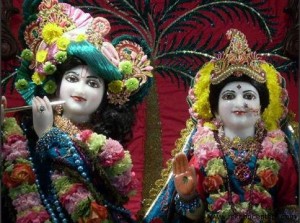
Sri Sri Rukmini-Dwarakadisha, Los Angles, USA.
Srila A.C. Bhaktivedanta Swami pays his first visit to London (September 1st 1969) to see his disciples there, and resides at 'Beatle' John Lennon's country estate at Tittenhurst, near Reading.
In December (14th) 1969, he conduct the Grand Opening and 'Avahan' Installation of Sri Sri Radha-Londoniswara at the Radha-Krishna Temple, 7, Bury Place, Holborne, London, just around the corner from the British Museum.
On 28th July 1970., Srila Prabhupada forms the Governing Body Commission (G.B.C.) as originally requested by Srila Bhaktisiddhanta Saraswati Thakur for his disciples to do.
The very next day (29th July) he establishes the Bhaktivedanta Book Trust (BBT). A book trust specifically for publishing the works of His divine Grace. Highly respected by scholars for their authority, depth, and clarity, the books are now used as standard text books in numerous college, and University courses.
As a publishing enterprise it has to date published, and distributed world-wide more books in number, unequalled by anyone book publishing house. (In some ISKCON literature 1972 is the date given as the foundation of the BBT.)
August 29th 1970, marks the instituting of the 'Life Membership Program' in Calcutta. Later that fall, he performs a series of preaching tours with his American and European disciples.
May 1971, Srila Prabhupada signs a contract with MacMillan Book Publishing Company to print the unabridged edition of 'Bhagavad Gita As It Is'.
1971 (May) marks the acquiring of five acres of land in Sridham Mayapura, near the birthplace of Lord Chaitanya, Nadia, West Bengal. This will further one of the purposes of the society.
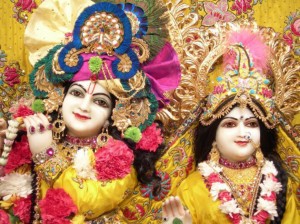
Sri Sri Radha-Londoniswara, London, UK.
Sometimes some of Srila Prabhupada's godbrothers would try to criticise him saying that they had noticed that when he came to Mayapura that he didn't stop his vehicle at the Gaudiya Math get down and pay obeisances as the others did at the 'samadhi' tomb of Srila Bhaktisiddhanta Saraswati Thakura. Srila Prabhupada stated that it was not that he saw his spiritual master only in that place, he said that never was there a second of any day that he felt the absence of his spiritual master. He always felt the presence of Srila Bhaktisiddhanta because actually he was always in his association.
We can truly see that Srila Prabhupada followed in the mood of the great predecessor acaryas like Sripad Madhwacarya, Sripad Vyasa Tirtha and the Goswamis of Vrindavana, for he was never simply attached to the worldly system of 'varna' and 'ashrama', or materialistic etiquette and its' dogma. But rather knew how to please Lord Krishna, and subsequently all others, by adapting whatever situation occurred into a favourable one for serving Him.
Anyone could see, he was a great 'Vaishnava brahmin' of the highest character, but when necessity called for it he did not hesitate to involve himself in day to day management to ensure that his preaching mission, his life's mission to fulfil the order of his 'Guru Maharaja', went on, which ordinarily someone who was thinking himself to be a 'sannyasi' or a big big 'guru' doesn't seem to do. In fact on numerous occasions he said that he would do anything to assist in the preaching mission of his 'guru maharaj'. One such instant that come to mind was with a 'sankirtan' book distributor who required something on a shelf, and asked Srila Prabhupad if he could stand on his bed to reach it. The Devotee was immediately told that for preaching you can stand on my head.
On an arrival address Srila Prabhupada spoke about the caste system in India. He defined the four social castes, and then especially glorified the 'brahmins'. Thinking they had found a loop-hole in his spotless character, a reporter poised a subtle challenging question. "So what caste are you?" The humble reply, "I'm a fifth class, servant of the other four!", startled everyone there.
From time to time fundamental, fanatical and other poorly informed groups; deprogrammers etc., published books in which they found fault with Srila Prabhupada's fledgling and 'newly converted' disciples, yet none to my knowledge were so brave, or so foolish as to find fault with him, the pure surrendered Devotee of the Lord.
Now we are seeing the fruits of Srila Prabhupada's selfless surrender, but according to some, one in the renounced order of life should not cross a small ocean. And if one is thinking himself as a material designation such as a 'sannyasi', then as Sripad Rajendra Tirtha inferred to Jayadharma Tirtha (Vijayadhvaj Tirtha), surely it is better that one doesn't go anywhere least he become contaminated, but for pure Vaishnavas there is a higher principle. H.H. Sri Bannajee Govindacharya gives his support to such selfless preaching to further the 'dharma'.
However, June 1971, saw Srila Prabhupad visiting Moscow the seat of communistic atheism, and plants the seed of Krishna consciousness there, by which we see today, the fruits of many Temples, and tens of thousands of Devotees have emerged.
In 1972 Srila Prabhupada began the Vedic system of primary and secondary education in the West by founding the ' Bhaktivedanta Swami gurukula' school in Dallas, Texas. Since then many more have been developed around the world.
In March 1972 he performs the consecration, and cornerstone laying ceremony ('Deva Grharambha') at Hare Krishna Land his newly established and threatened project in Juhu, Bombay.
Just after this still in March 1972, he aquires land in Raman Reti, Sri Vrindavan Dham, and conducts the cornerstone laying ceremony there also.
Following a vigorous 12 year preaching tour which took him fourteen times around the world, and to six continents. Yet his 'sadhana' of taking rest early, and rising at midnight to write through the night afforded his prolific quality literary output.
At the Rathyatra in London July 1973, even at a very advanced age of 77-78 he dances ecstatically the full length of the procession course from Hyde Park Corner to Trafalgar Square, for at least an hour and a distance of about 3-4 kilometres (around 2 miles).
Srila Prabhupada was so ecstatic that even the Devotees who were seated on Lord Jagannath's cart, Revatinandan Maharaj leading wonderful kirtans, they were told to come down off the cart and join the fun. They did, and by the time the Rathyatra reached Picadilly Circus Srila Prabhupada was dancing and jumping, clean off the ground.
On November 10th 1974, Srila Prabhupada completes his mammoth commentary on Sri Chaitanya Charitamrta with elaborate translations and purports.
April 20th 1975, he organises to bring local 'brahmin' priests to accompany his ecstatically jubilant disciples as functionary priests under his instruction to perform the 'Avahan' and Grand Opening of the newly completed Sri Sri Krishna-Balaram Mandir, in Vrindavan.
On April 20th 1975 Srila Prabhupad meets with Prime Minister of India, Indira Gandhi.
1975, also marks a great scientific achievement for Srila Prabhupad. He founds the 'Bhaktivedanta Institute', the scientific branch of ISKCON headed by a group of his disciples from the scientific community, now dedicated to Srila Prabhupada's mission of proving that 'Life Comes From Life'. Thus smashing former atheistic, rationalistic, Darwinistic theories of 'Material Evolution'.
"One time in Mayapura, we had just completed that four-storey building, and Srila Prabhupada was very happy to be there. Of course he had a place to sit, so now we could lay down.
He was taking 'prasad'. There was a big feast that day for the opening of the Temple, and [after] he was taking, and he heard all this noise in the back. He got up and looked out of the [window in the] back. He called all the G.B.C.'s immediately come, call Bhavananda, Jayapataka everyone (everyone laughs). Also, he used to call, all of a sudden. 'Call everyone!' so everyone was called, they all run! and there he was looking, and there in the back, there was a ditch about 50 feet from the wall of the Temple where all the leaf plates from the feast had been thrown. And there, there was about 15 local children, who were fighting off the dogs and taking the plates. You know, how Devotees, they get a little piece of uncooked 'puri', and throw it back on the plate, or there's a little bit of chutney juice! Anyway the children were taking the plates and licking them, and taking the little half 'puris', and whatever they could get and eating that. And Srila Prabhupada was looking, 'Just look at how they are eating this, they must be so hungry. They must be so hungry! We must feed them!'
"Then Srila Prabhupada started crying and said, 'This is Krishna's house, Krishna is the father of everyone, if you want to make 'real Temple' then you must make arrangement anyone within a 10 kilometre circumference, that they near go hungry. Then this is Krishna's house – in the presence of the father the child will never go hungry. Immediately make arrangements to distribute 'prasadam'. ' And that's the beginning of ISKCON Food Relief (the fore-runner of 'Food For Life'). "(Jayapataka dasa Goswami. 29th August 1979. Bhaktivedanta Manor, London.)

'This is Krishna's house, Krishna is the father of everyone, if you want to make 'real Temple' then you must make arrangement anyone within a 10 kilometre circumference, that they near go hungry. Then this is Krishna's house - in the presence of the father the child will never go hungry. Immediately make arrangements to distribute 'prasadam'.
Srila Prabhupada's mission was so necessary. I, for one, would not be here writing this if it were not for his compassion for the fallen conditioned souls, such as myself, who somehow, or another had fallen into this material pool, and were suffering like anything there. This is not some esoteric poetry or exaggerated 'arthavadic' statement on my part, I mean suffering LIKE ANYTHING.
Srila Prabhupada, by his mercy and on the order of his spiritual master Srila Bhaktisiddhanta Saraswati Thakura, came to smash the philosophies of impersonalism and voidism. Not only are pure Vaishnavas crossing a small watery ocean like a calf's hoof-print, but are successfully crossing the ocean of birth and death, and enabling many thousands of souls in this world to do the same. On the order of 'guru' and Krishna, "..therefore, the Madhwa Sampradaya is successfully spreading all over the universe" (A.C. Bhaktivedanta Swami Prabhupada in his purport to the verse Srimad Bhagavatam 1:9:7. page 75.)
Like all of the predecessor 'Acaryas' we need to remember, relish and give thanks to such a devoted and pure soul as Srila Prabhupada.
To enable this mission to be established Prabhupada nearly sacrificed his very life on the journey across the treacherous Atlantic Ocean that remitted two heart attacks, but this humble pure devotee's love for the Lord changed everything. The Lord even appeared in a dream to Srila Prabhupada, in a boat full with many incarnations, saying they would protect their lonely ambassador. The captain of the Jaladuta (the ship on which Prabhupada left India) said that it was the smoothest voyage he had ever had, and asked Prabhupada to come with him on the return to guarantee another smooth Atlantic voyage.
To capture the mood of Srila Prabhupada we have included the English translation of the Bengali prayer that he wrote on his arrival at Commonwealth Pier on September 17th 1965, Boston, U.S.A.
One should try to picture the scene, looking at the seat of western materialism where he had come to fulfil the order of his spiritual master. The intensity of standing on the battle field overlooking the armies assembled, or ready to embark upon one's allotted "sankirtan spot" ('prabhu datta desha') prepared with intent, meditative, observant, dependant, and where to start? Srila Prabhupada, on board the ship Jaladuta, carrying within his heart the order of his spiritual master to spread the teachings of Sri Caitanya, the wisdom of the 'Acaryas', beyond the borders of India throughout the entire world, oversaw his purpose. As he looked out upon Bostons' bleak and dirty skyline he could understand the difficulty of this sacred mission for these Godless people. Thus, with perfect humility, he composed this historic prayer, praying for the deliverance of all the fallen souls.
1. " My dear Lord Krishna, You are so kind upon this useless soul, but I do not know why You have brought me here. Now you can do whatever you like with me.
2. But I guess You have some business here, otherwise why would You bring me to this terrible place?
3. Most of the population here is covered by the material modes of ignorance and passion. Absorbed in material life, they think themselves very happy and satisfied and therefore they have no taste for the transcendental message of Vasudeva. I do not know how they will be able to understand it.
4. But I know Your causeless mercy can make everything possible because You are the most expert mystic.
5. How will they understand the mellows of devotional service? O Lord, I am simply praying for Your mercy so that I will be able to convince them about Your message.
6. All living entities have come under the control of the illusory energy by Your will, and therefore, if you like, by Your will they can also be released from the clutches of illusion.
7. I wish that You may deliver them. Therefore, if You so desire their deliverance, then only will they be able to understand Your message.
8. The words of the Srimad Bhagavatam are Your incarnation, and if a sober person repeatedly receives it with submissive aural reception, then he will be able to understand Your message.
9. It is said in the Srimad Bhagavatam (1:2:17-21.): "Sri Krsna, the Personality of Godhead, who is the Paramatma (Supersoul) in everyone's heart and the benefactor of the truthful devotee, cleanses desire for material enjoyment from the heart of the devotee who relishes His messages, which are in themselves virtuous when properly heard and chanted. By regularly hearing the Bhagavatam and rendering service unto the pure devotee, all that is troublesome to the heart is practically destroyed to nil and loving service unto the glorious Lord, Who is praised with transcendental songs, is established in the heart, the modes of passion ('raja') and ignorance ('tamas') and lust and desire ('kama') disappear from the heart. Then the devotee is established in goodness and he becomes happy. Thus established in the mode of goodness, the man rejuvenated by loving service to the Lord gains liberation from material association ('mukti') and comes to know scientifically of the Personality of Godhead. Thus the knots of the heart and all misgivings are cut to pieces. The chain of fruitive actions ('karma') is terminated when one sees the Self as master."
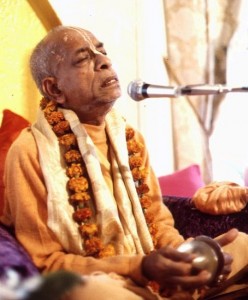
How will they understand the mellows of devotional service? O Lord, I am simply praying for Your mercy so that I will be able to convince them about Your message.
10. He will become liberated from the influence of the modes of ignorance and passion and thus all inauspicious things accumulated in the core of the heart will disappear.
11. How will I make them understand this message of Krishna consciousness? I am very unfortunate, unqualified, and the most fallen. Therefore I am seeking Your benediction so that I can convince them, for I am powerless to do so on my own.
12. Somehow of other, O Lord, You have brought me here to speak about You. Now, My Lord, it is up to You to make me a success or failure as You like.
13. O spiritual master of all the world! I can simply repeat Your message, so if you like You can make my power of speaking suitable for their understanding.
14. Only by Your causeless mercy will my words become pure. I am sure that when this transcendental message penetrates their hearts they will certainly feel gladdened and thus become liberated from all unhappy conditions of life.
15. O Lord, I am just like a puppet in Your hands. So if You have brought me here to dance, then make me dance, make me dance, O Lord make me dance as You like.
16. I have no devotion, nor do I have any knowledge, but I have strong faith in the Holy Name of Krsna. I have been designated as Bhaktivedanta, and now if You like You can fulfil the real purport of Bhaktivedanta.
(Signed – the most unfortunate, insignificant beggar A.C. Bhaktivedanta Swami, on board the ship Jaladuta, Commonwealth Pier, Boston, Massachusetts, U.S.A., 18 September 1965.)
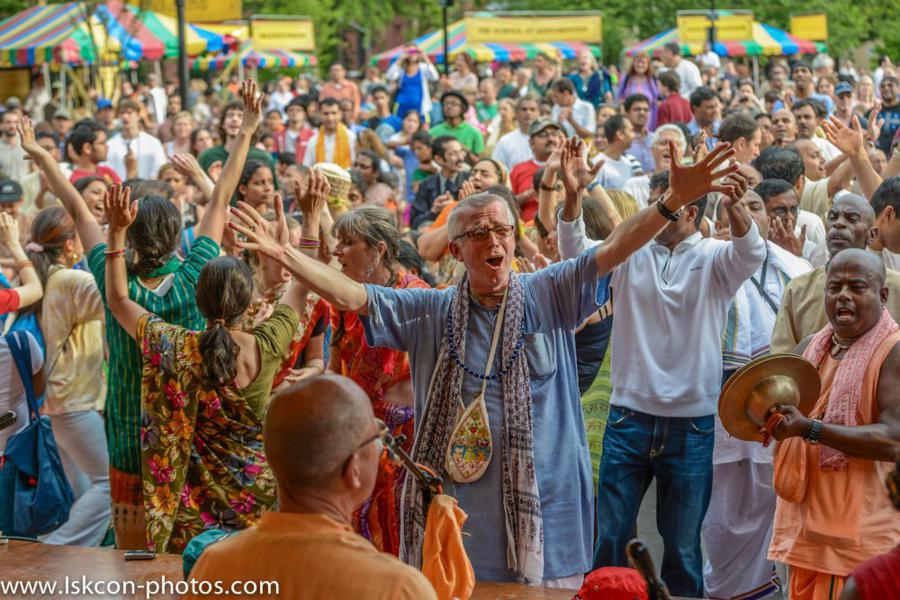
Only by Your causeless mercy will my words become pure. I am sure that when this transcendental message penetrates their hearts they will certainly feel gladdened and thus become liberated from all unhappy conditions of life.
Arriving with only forty rupees in his pocket and a trunk full of Canto One of the Srimad Bhagavatam in three parts, Srila Prabhupada, the ambassador for the priceless truth of ancient India, the panacea, that makes lame men walk and blind men see, was about to embark on his mission that we have seen, has changed the face of the whole earth. Srila Prabhupada relied completely on Krishna, sitting down beneath a tree in Tomkins Square Park. The 'Yuga Dharma' was put to the test – "Just chant 'Hare Krishna' and your life will be sublime." Srila Prabhupada's faith in 'guru' and Krishna gave everyone who came in contact with his message the living purport to devotional life.
On the Jaladuta ship in mid-Atlantic, suffering heart attacks, Srila Prabhupada composed the following prayers knowing how, by the order and desire of Lord Sri Chaitanya and Srila Bhaktisiddhanta Saraswati, everything would go on.
sri siddhanta saraswati saci-suta priya ati
krsna-sevaya jara tula nai
sei se mohanta-guru jagater madhe uru
krsna bhakti dey thai thai
tara iccha balavan pascatyete than than
yoy jate gauranger nam
prthivite nagaradi asamudra nada nadi
sakalei loy krsna nam
"Sri Srimad Bhaktisiddhanta Saraswati Thakura, who is very dear to Lord Gauranga, the son of mother Saci, is unparalleled in his service to the Supreme Lord Sri Krishna. He is that great saintly spiritual master who bestows intense devotion to Krishna at different places throughout the world. By his intense desire, the Holy Name of Gauranga will spread throughout all the countries of the western world. In all the cities, towns and villages on the earth, from all the oceans, seas, rivers and streams, everyone will chant the Holy Name of Krishna."
Sitting on a park bench in New York City, Prabhupada, in conversation with an acquaintance said, "We have so many Temples, so many Devotees, so many books. There is just some time separating us." And it became a fact. By Srila Prabhupada's humility, fathomless faith and determination to satisfy guru, the parampara and Krishna, to save all the fallen souls suffering due to ignorance in this materialistic age of Kali, his years of intense study and writing had given Krishna a perfect instrument to work with.
When success came, as was his visualisation, with so many Devotees, so many books and so many Temples, Srila Prabhupada remained all the time meek and humble.
In a letter of 1968 Srila Prabhupada wrote: "Personally, I am a nonentity; I have come here on the order of my Spiritual Master, and He has kindly sent all you boys (and girls) to assist me. So whatever is being done, there is no credit for me, but all the credit goes to my spiritual master, because He has arranged everything, and I am simply to abide by His order." (A.C.Bhaktivedanta Swami Prabhupad. Letter, 68:10:34 Book Ref No.)
Srila 'Prabhupada: 'The master at who's feet other masters sit, never ever utilised any facility for sense gratification. His purity and true renunciation was, and is, admired by all. Even sometimes persons would criticise Srila Prabhupada's followers due to our deep conditioning, not coming to the standard Srila Prabhupada had set, but still no honest man could criticise Srila Prabhupada. He is still cherished in the memories of millions for his perfect Vaishnava qualities, more tolerant than a tree, humbler than a blade of grass, and always offering respect to others. Even he would glorify his disciples for their helping him, though the disciples knew it was by Srila Prabhupada's mercy that they were even there. Kindling the smallest flames of devotion, the perfect 'hotri' set the entire world ablaze with Krishna Consciousness.
If any think they can do as, or better than he, I challenge you to do it. Talk is cheap, achievements take surrender, and if by the Lord's mercy you too are successful, then wonderful, we all benefit the more! Please only speak to glorify who is worthy.
In just twelve short years he initiated many thousands of disciples, established Temples in every major city in the world, and travelled extensively twelve times around the world in as many years. He established the Bhaktivedanta Book Trust, which is now one of the biggest book publishing houses in the world which distributes transcendental literatures at a rate unparalleled. In every university, library, school, and many millions of houses there are now to be found the transcendental time bombs of Vedic wisdom – Bhagavad Gita As It Is, Sri Ishopanishad, Bhaktirasamrta Sindhu (Nectar of Devotion), Srimad Bhagavatam, Sri Caitanya Caritamrta, and hundreds of small books and booklets on spiritual life.
All the great 'acaryas' made commentaries on the Vedanta Sutra, and our Srila Prabhupada also mentioned that he had this planned. Actually if one studies Srila Prabhupada's life and instructions on how to take up spiritual life, one will realise how the person "Bhagavata" and the scripture "Bhagavata" are non-different 'saksad dharitvena samasta sastraih'!
Every word that Srila Prabhupada spoke came as a translation of a verse with crystallised realisations in the form of the Bhaktivedanta purports. If one reads the purports of the previous 'acaryas' which the faithful surrendered soul Srila A.C. Bhaktivedanta Swami echoed, one can see that he embellished the words of all the pure 'Vaishnava acaryas' in our line. What he actually did was virtually gave up his own ideas, and even speech patterns, to assimilate and simply deliver the word of the previous authorities, in a pure and presentable manner. He used his intelligence properly to present it. That to my understanding is real self surrender. This is why Krishna empowers such Devotees, for Srila Prabhupada had no other interest but to spread the pure teachings of the Brahma Madhwa Gaudiya Sampradaya to all who could take it. Every action that he made, every 'mudra', gesture told of the ageless culture coming down from the Lord. If you doubt this, study his life. Srila Prabhupada may not have formally written Vedanta Sutra, but his life was the living Bhakti-Vedanta-Sutra, and therefore must be accepted along with all the great 'Vaishnava acaryas' like Narada, Srila Vyasadeva, Acarya Madhwa, Sri Chaitanya, the Goswamis, Baladeva Vidyabhusana, Srila Bhaktivinoda and Srila Bhaktisiddhanta Saraswati Thakura. Earnestly studying the commentaries of the great 'acaryas', Srila Prabhupada preached their glories constantly.
Srila Prabhupada states in his purport to Caitanya Caritamrta, Adi Lila (7:21.) that "All the codes of the Vedanta Sutra need not be examined here however, since we intend to present the Vedanta Sutra in a separate volume." I suggest, that He was that volume personified. Actually if one takes the time to read the purports of these verses of the 7th chapter of Adi Lila of Sri Caitanya Caritamrta, one will easily understand the purport to the stanza the person "Bhagavata" and the book "Bhagavata" are one and the same. Srila Prabhupada is a living example of the Vedanta Sutras. Sacrificing everything for the mission of the Lord, barely sleeping at night, he would stay up translating and writing his purports, then daily giving lectures, going on walks and having room discussions with his disciples and guests. Whatever way one looks at this, the conclusion must be that Srila Prabhupada is definitely the bona-fide representative of the Brahma-Madhwa-Gaudiya Sampradaya. As all the acaryas have left their commentary on Vedanta Sutra, all complimenting the original author, and the supporting commentaries by great acaryas like Madhwa, so Srila Prabhupada left his for us in the modern age, in the form of his life, the Bhakti-Vedanta Sutra.
On his last journey around the world stopping at London's Bhaktivedanta Manor, I, for a very short time, had the great good fortune of being able to see His Divine Grace and have but a few "exchanges". At this time I accepted His Divine Grace as the Lord of my life, my spiritual master, not officially, but within my heart. This, no one can deny me. Thus Srila Prabhupada has changed my life, and feeling so indebted, I humbly dedicate this book to His Divine Grace, in his centennial year (1896-1996), and who is an epitaph of the "Legacy of Sripad Ananda Tirtha, Madhwacarya, Bhagavatpad", – Srila A.C. Bhaktivedanta Swami Prabhupada, for if it had not been for him, I have no idea of where I would be now, or my future. Nor would you be reading this book!
At this time his physical health had been poor for a while now, and virtually his body had ceased to work. In London when he came in August, we were all so excited to see him. And after delays at the airport, which gave way to prolonged ecstatic 'kirtan' by Devotees from all over Europe (England, Ireland, Scotland, Germany, Holland, etc.) up to the point when his car came through the "Manor Gates" and up to the reception room door. But we were shocked at his emaciated appearance, it was heart rending. Yet, his eyes, sparkling behind tinted glasses told of a different situation. They were penetrating, warm and smiling, reaching out and touching the very core of each of us.
Watching his devotion to Sri Sri Radha Gokulananda was touchingly memorable, and his 'traditional' visit to Radha Londonishwara via Radha-Bankabihari's (an old friend from Vrindavan's Deity, who lives in London) even in such a condition and Janmastami and Vyasa-puja there at the Manor.
A few months after his visit to London, after giving up eating, sleeping etc., only subsisting on the Deity's 'caranamrta', he now returned to his beloved home, Vrindavana.
The concerned Devotees consulted astrologers on Srila Prabhupada's request with a view to gaining insight as to when this condition would pass. Everything indicated that this could be the time of Srila Prabhupada's disappearance. Although some said that if he were to survive this difficult time for his body, he would carry it on for a few more years. One astrologer suggested, 'maha-mrtyum jaya-japa' and 'havan', to which Srila Prabhupada responded, "So this 'japa', 'maha-mantra japa' and 'bhagavat-path', that I am doing". 'Srimad Bhagavatam-patha'. So either read 'bhagavat' or chant 'Hare Krishna', and let me lie down like this, that's all, as it is going on. Huh? (A.C.Bhaktivedanta Swami Prabhupada. October 14th 1977. Room Conversation.)
In his humility Srila Prabhupada requested many of his godbrothers to come, and those who could not come, he sent telegrams asking for their forgiveness of any offences that he may have committed while trying to push on, and fulfil the preaching mission of Srila Bhaktisiddhanta Saraswati Thakur Prabhupada. Humbly Srila Prabhupada requested like this, and the loving Devotees surrounding his bedside, carried out his every wish. Many godbrothers came, sharing treasured moments together, knowing Srila Prabhupada's nature, and heart's desire, and intent – there was no question of any offence being taken.
As a complete philosophy, a full and rich culture, a way of life, and a way to death, and beyond, the 'acaryas' like Srila Prabhupad have left a wealth of practical guidance, up to the last that we can take advantage of to help us advance.
Some things as eternal truths, some to be applied according to 'time, place and circumstance'. Nothing was left untouched, no mysteries, or controversies. The chaste 'Prabhupadanuga' followers recognise this, look for what he has left, and resolve, and push on his movement, as he did himself.
One dear friend of Srila Prabhupada’s came to see him, Niskinchina Krishna dasa babaji maharaj:
Krishna dasa Babaji: It is wonderful that he is speaking so nicely, with full sense.
Bhakti-caru: He's saying that it's wonderful that you are in full consciousness.
Prabhupada: He doesn't expect this consciousness in this condition. Therefore he is astonished. Actually, physically–finished, everything. So wherefrom the voice coming and wherefrom intelligence coming? That he is astonished…
(Venue: Srila Prabhupada's house, Sri Krishna Balarama Mandir, Vrindavana. Date: 3rd November 1977 [11 days before Srila Prabhupada departed] SRILA PRABHUPADA KI JAYA! )
Srila Prabhupad residing in the holy Dham of Sri Vrindavan, on Monday November 14th, 1977, at 7:30 pm, which fell upon the Caturthi of the Gaura (Sukla) Paksa, Mula nakshatra, gave up this mortal frame surrounded by loving disciples engaged in 'Harinam-sankirtan', the congregational chanting of the Holy Name.
Translating Srimad Bhagavatam up until the very last breath, in a peaceful condition, and with the Holy Name on his tongue, Srila Prabhupada passed from this world in Sri Vrindavana Dhama to rejoin his worshipful Lords Sri Sri Nitai Gaura, Sri Sri Krishna Balarama, and Sri Sri Radhe Shyamasundara in Their eternal abode.
"He reason ill who tells that Vaisnavas die
When thou art living still in sound!
The Vaisnavas die to live, and living try
To spread the Holy Name around !"
(Poem by Srila Bhaktivinoda Thakura)
In many ISKCON centres where Srila Prabhupada visited, and had his office, 'darshan' rooms and quarters, there are now museums holding many of his personally used artefacts, dedicated to his loving memory. In Mayapura, West Bengal a fine structure has been built in memorial to him, his 'Pushpa samadhi'. In the ISKCON Sri Sri Krishna Balaram Mandir on Bhaktivedanta Swami Marg, in Raman Reti, an area of Vrindavana no longer on the out-skirts, one will find his 'Samadhi Mandir' (his ' Brindavan') where one can come and pay homage to His Divine Grace. There too one can visit his personal quarters.
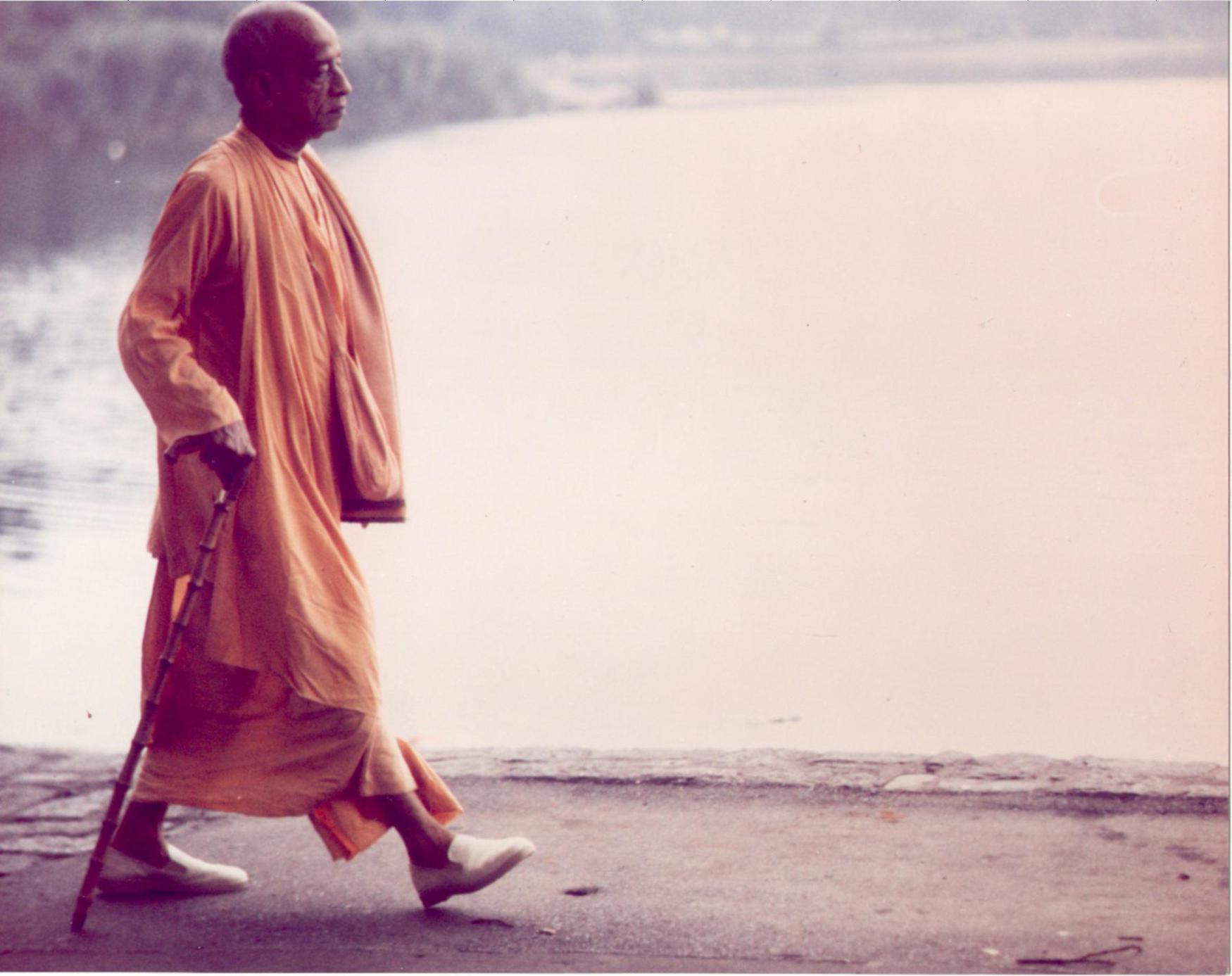
"He reason ill who tells that Vaisnavas die When thou art living still in sound! The Vaisnavas die to live, and living try To spread the Holy Name around!"
